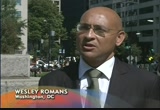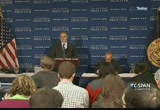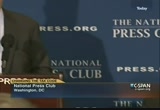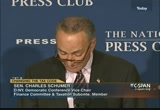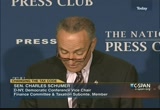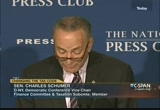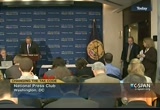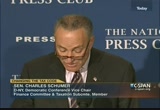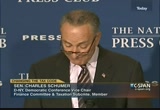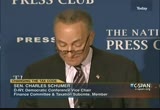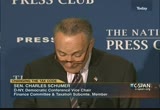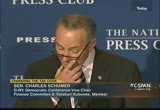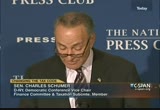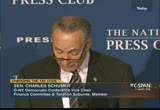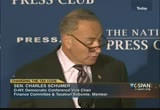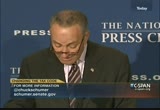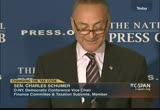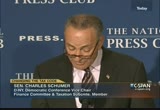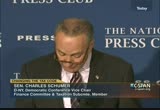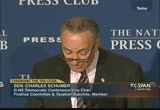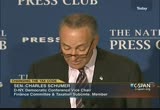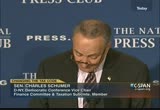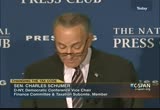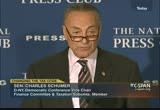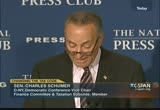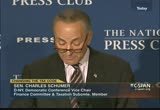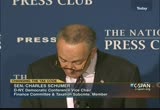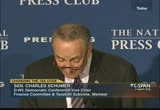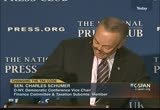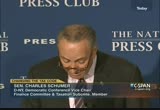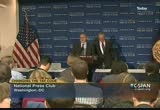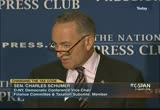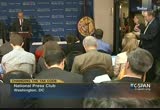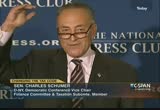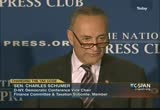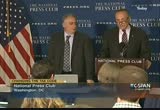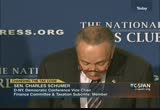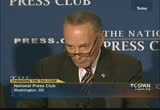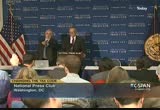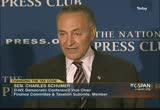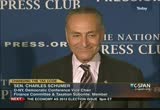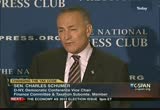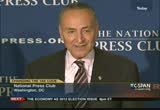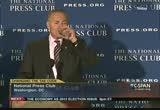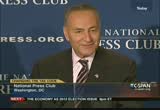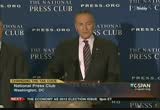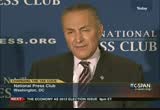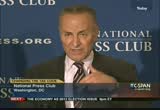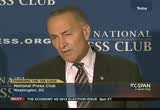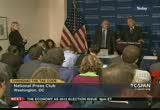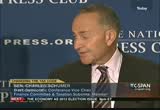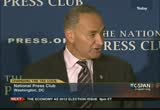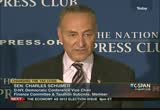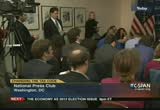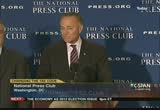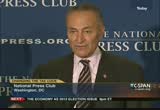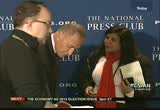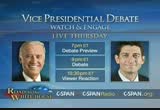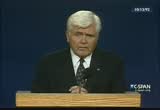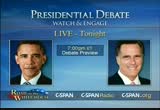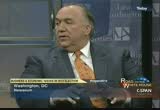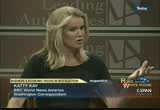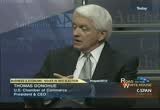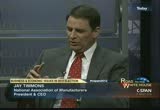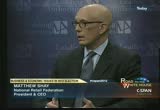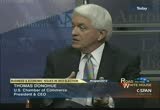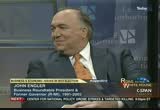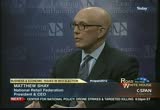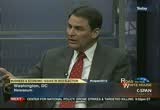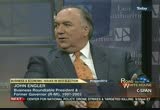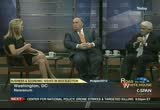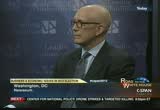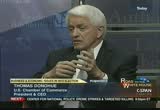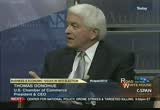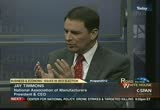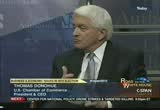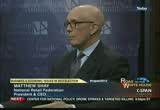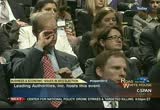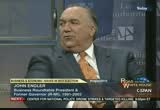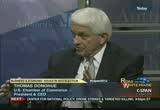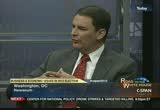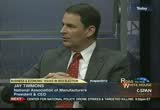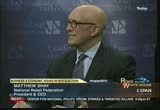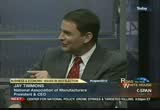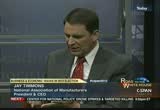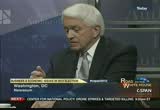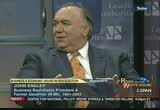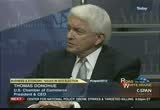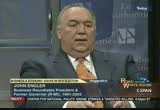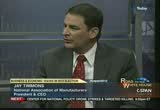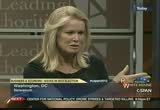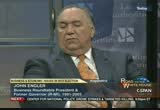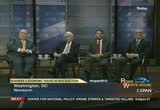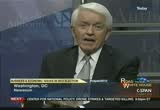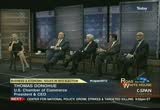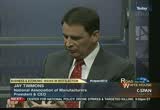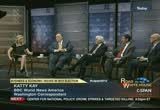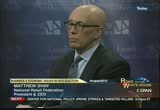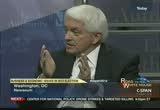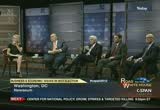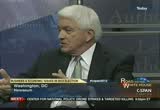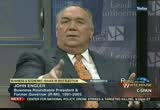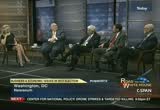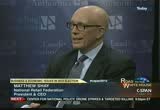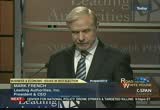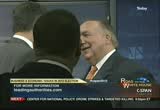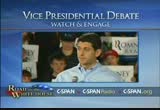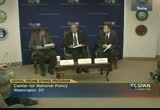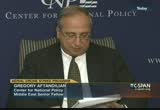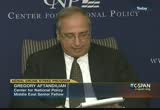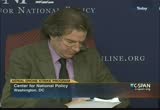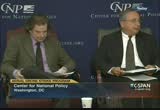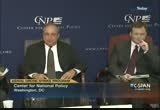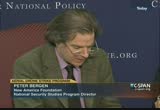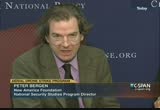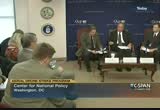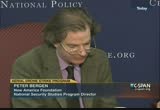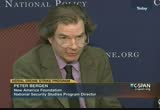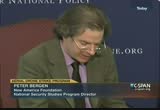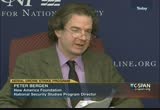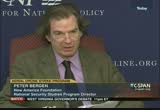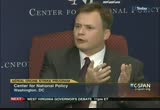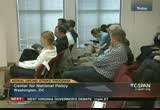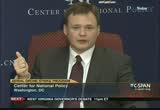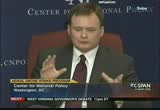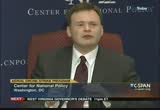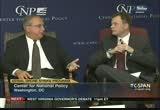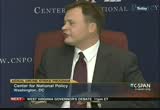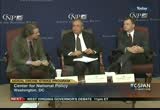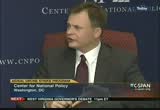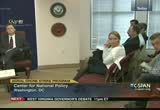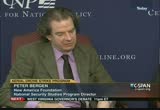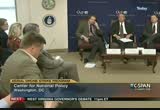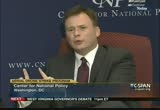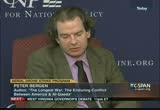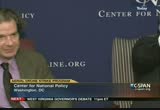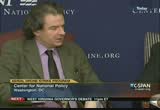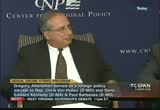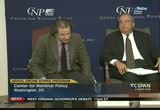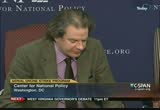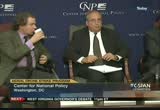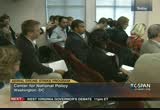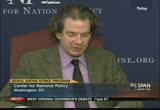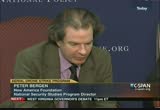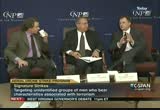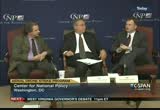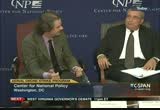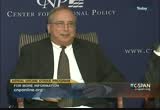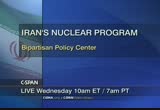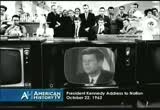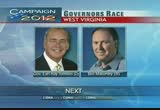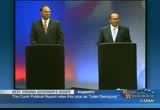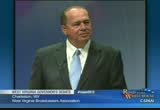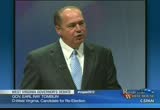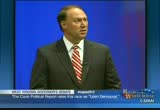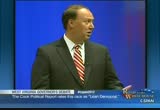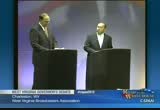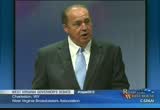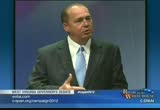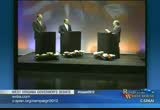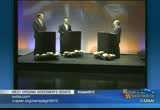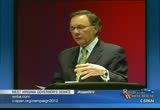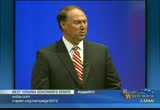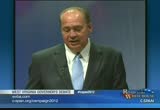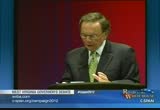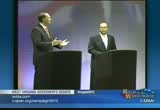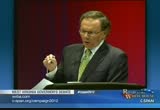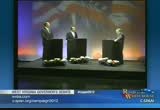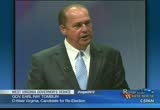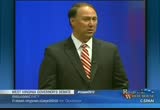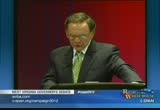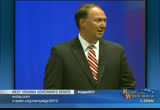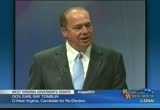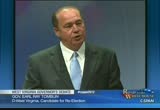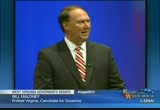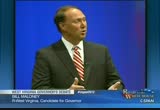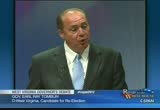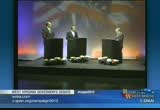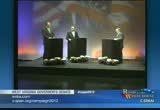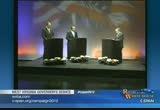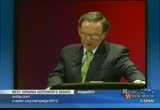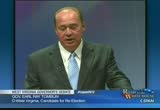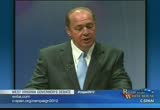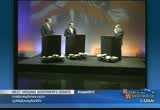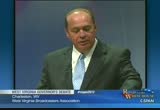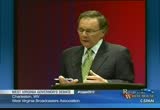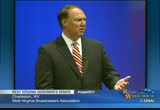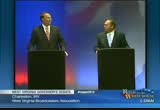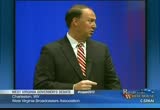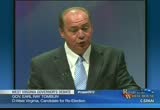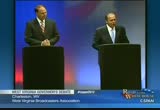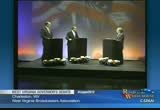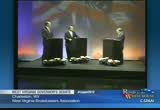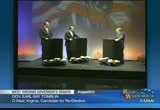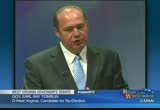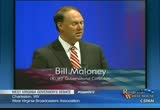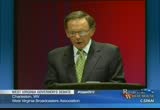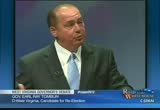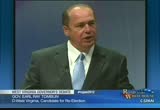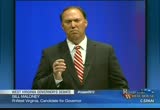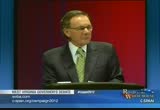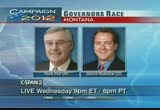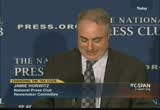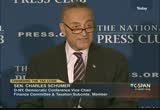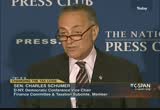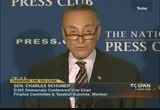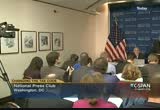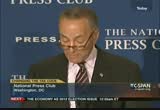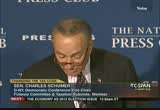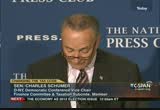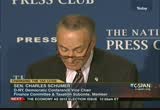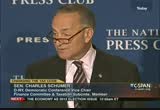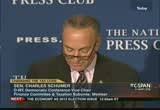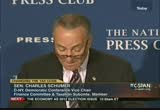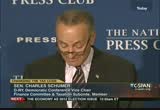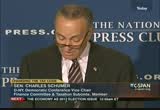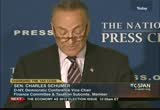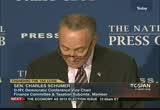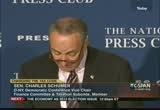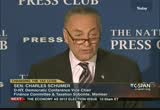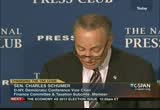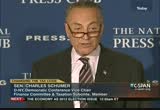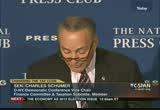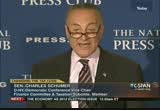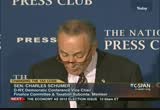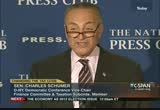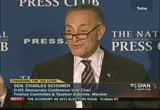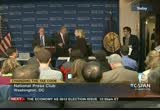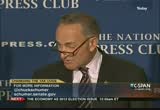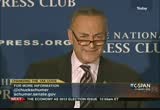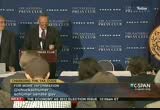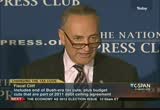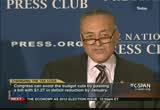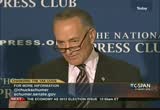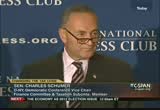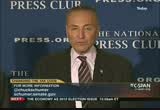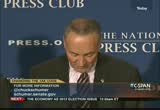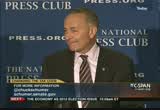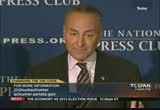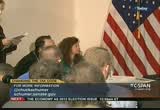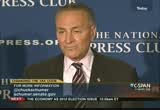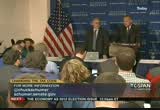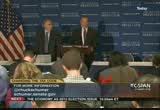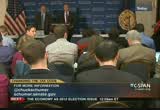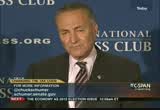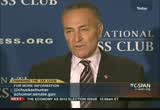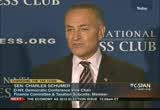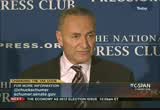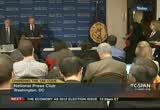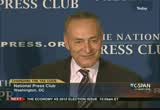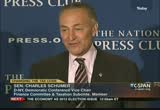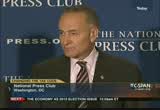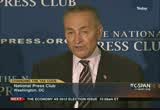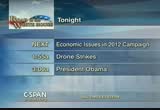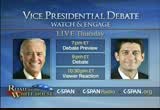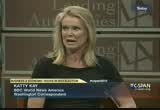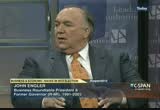tv Capitol Hill Hearings CSPAN October 9, 2012 8:00pm-1:00am EDT
8:00 pm
at 8:00 where he hosts different authors and he has discussions about the books they have written. it is an easy way to get information in those books without having to read them. >> he watches c- >> in his comments on tax policy, senator chuck schumer talked about taxes. he spoke and answered questions at the national press club for about an hour.
8:01 pm
>> good morning. we're starting right on time today. i want to thank you for coming. i want to thank those who are joining us on c-span. on behalf of the national press club we're honored to have with us the senior senator from new york charles schumer. the senator will address the topic of tax reform. i just want to say i think this is an appropriate topic following a columbus day weekend. in club bus' time the prevailing weekend that there were dragons right over the horizon and most people thought the world was flat and anyone setting nauf a journey would go off the cliff. columbus thought he could find a new route. and today we're going to be exploring new tax reform and how to avoid a fiscal cliff. the senator will speak for
8:02 pm
about 20 to 25 minutes and then we will open up to questions. senator? >> ok. thank you, jamie for that very timely introduction. i want to thank the national press club. here's what i said yesterday at the new york city columbus day parade to the many bystanders. [speaking foreign language] that means everyone's italian. so it's tomorrow. so i'm back to not being italian anymore. there is perhaps no issue more complex than tax reform. but for all the disagreements on taxes as most policymaker, democrats, republicans, independents what the broad outline what tax reform might look like and you get a stark lingly consistent answer. broaden the base by getting rid of loopholes in the tax code that approach has distinguished
8:03 pm
lineage. ronald reagan and the 1986 congress invented this. in the upcoming talks on the fiscal cliff, we should scrap this. the old style of tax reform is obsolete in a 2012 world. it does not fit the times because there are two new conditions that did not exist in 1986 but are staring us in the face today. first, a much larger and much more dangerous deficit and second, a dramatic increase been income and inequality. old-style tax reform could make both conditions worse. but don't dismiss the old framework lightly. credit for the 1986 reform law belongs to democrats like bill bradley in the senate.
8:04 pm
just as much as to president reagan. as a member of the house back then, i not only voted for it, but i whipped the votes to make sure it passed. i was on the committee set up by dan rostenkowski to get it done. the approach made a good deal of sense at the time. then, as now, the code was littered with egregious loopholes that needed to be reformed. recall the so-called passive law schools that were in place back then. they allowed wealthy taxpayers to gain the system. someone could invest in a bowling alley and then, if the bowling alley lost money, they could take a write off many times larger than their initial money incestment of their entire income tax liability. we need to get rid of such a gimmicky tax shelter. paring these loopholes allowed us to cut rates. at the time, that made sense, too. while it is critically
8:05 pm
important to insure that everyone, especially those at the top pay their fair share, 50% of the top federal tax rate is what we had until 1986 and that was admittedly too high. yes, reagan-style reform worked over 25 years ago. as a result, it still has a great deal of appeal to some of the most serious fiscal thinkers in washington. this includes the gang of six, recently expanded to a gang of eight which last year published a white paper based largely on the 1986 model. some of them are among my best friends in the senate. if you asked me how a compromise might ultimately emergd during the lame-duck session, i would say they represent perhaps our best hope right now to achieve a
8:06 pm
bipartisan deal. leaders on both sides are actively encouraging talk. i certainly am. i hope they can revisit their approach to tax reform. our needs today are different compared to 1986. we cannot take the same approach as we did that. we must reduce the deficit which is strangling our economic growth of long term. we must seek to control or rise in income inequality which is hauling out the middle-class. 1986 model would be ineffective if not counterproductive to solving these two challenges. let me explain why -- first, with regard to deficit-reduction, tax reform 25 years ago was revenue-neutral. it did not strive to cut the debt. today, we cannot afford for it not to permit a national debt is apartment 73% of gdp which is nearly double what it was in 1986.
8:07 pm
it would be a huge mistake to take the dollars we gain from closing loopholes and put them into reducing rates for the highest income brackets rather than into reducing the deficit. that is what i want to say here today. to fix the deficit, we of course need to cut spending. the budget control act has a down payment of $900 billion in domestic discretionary cuts. on top of that, as democrats are committed to finding a significantly more savings as part of a grand bargain including serious reform to entitlements. in addition to more cuts, we also need to bring in more money. the president's budget has called for around $1.50 trillion in revenues over the next decade. the revenue side of the federal ledger is underperforming by historical standards. for three years, we have had revenues coming into the federal government at a level
8:08 pm
around 15% of gdp. that is a 60-year low. since 1960, we have never had a balanced budget in a year when revenues were less than 18% of gdp. in 2001, the last year we had a surplus, revenues were at 19.5% of gdp. we have a revenue problem. we need tax reform to solve it. some on the left have suggested corporate tax reform could be a source for new revenue but here i disagree. to preserve our international competitiveness, it is imperative we seek to reduce the corporate rate from 35% and do it on a revenue-neutral basis. this will boost growth and encourage more companies to reinvest in the united states. corporate tax reform, under the leadership of chairman baucus senator hatch should be treated separately from our attempt to get a handle on the deficit.
8:09 pm
but when it comes to the individual side of the code, our approach must be different. in this part of reform, the new money we collect from broadening the tax base cannot all be applied to prepare -- to reducing rates or else we will not get enough revenues to strike an agreement on deficit reduction. using tax reforms to produce revenue departs from the 1986 model. some still have not accepted as reality. they believe the dollars from loophole closing should all be used for reduction rather than deficit reduction. ed kleinbart at the joint committee for taxation recently had a message for these holdouts. >> there is perhaps no issue facing congress that is more complex than tax reform. for all the disagreements on
8:10 pm
taxes, most policy-makers asked what the broad outline of tax reform might look like when you ask them is you get a startling difference in dramatically . it cannot ignore the most fiscal problem we face, our mounting deficit. ok. fine, say some well-meaning conservatives. all we have to do is broaden the base enough to both reduce rates and reduce the deficit. the 1986 model, they say can still apply. but hold on a minute. there's a second factor we must consider when we approach tax reform. it's the staggering rise in income inequality. in 1986, there was certainly wealth conglomeration at the top but not nearly to the degree as is true now. in the 1980's we had just come
8:11 pm
off a period dating back to world war ii that had the largest expansion of the middle-class in american history. since then, however, middle-class wages have stagnated. in fact, the last decade was the first since world war ii when median family income declined. and if that continues that has grave complications for the future of this country which has been founded on the expansion of an expanding pie. according to the congressional budget office, 30 years ago the top 10% receive 4% of national income. today, the share of income going to those same households has jumped more than 50% to 11.5%. according to one study looking at data up to 2007 just before the recession hit, the average income grew by a whopping 241%
8:12 pm
over the last 30 years. the average income for the bottom fifth fell -- grew by merely 11%. the net worth of the walton family, not the tv folks is equal to that of the bottom 30% of the country. one family has the same wealth about a third of all the people in america. the 1986 reform law did work to make the code somewhat more progressive. by among other steps reducing the tax preference for investment income. but subsequent changes to the code in particular the 2001 and 2003 tax cuts undid that work. the capital gains rate was reduced all the way to 15% giving a large advantage to those in the highest brackets. so high income earners also gain the most from president bush across the board rate
8:13 pm
cuts. according to the tax policy center, last year the bush tax cuts increased after -- after tax incomes for people making over $1 million by an average of 6.2%. that's about $129 a household but for those with incomes between $40,000 and $50,000 the increase was 2.2%. over time, our tax code has wydened the nation's wealth gap. reversing this trend ought to be a top goal of tax reform. at a minimum we certainly should not make the tax code any less progressive than it would be if the high income tax cuts expired. but in 1986 approach -- sorry, in 1986 style approach that promises upfront rate cuts to the wealthy is almost guaranteed to give middle income earners the short end of
8:14 pm
the stick. the reason is in order to raise enough money to both reduce rates and cut the deficit you would need to slash deductions and credits on a far greater scale than we did in 1986. middle income earners would not be spared. and because middle income earners so rely on these expenditures, the cost of losing them would likely exceed the benefit they received from a lower great. multiple experts verified that. this joint committee analyzed the plan authored by paul ryan. it found in order to provide a lower top rate of 25% for high income taxpayers in a way that doesn't add to the deficit, the elimination of expenditures would result in a $2,081 annual
8:15 pm
tax increase for a married couple of $100,000. that's not acceptable. the nonpartisan tax center reached a similar conclusion, promising a 20% across the board tax cut. the average household with children earning $200,000 or less would face an effective tax increase of $2041, very similar numbers. there is a lesson to absorb from these studies. be aware tax reform plans that only get specific about what top rate they want to lock in. it's also generally true that the lower the rate that gets promised, the fewer the details that get provided about the rest of their plan.
8:16 pm
simpson balls promised the top rate between 23% and 29% but take a hard look at how this would be accomplished. they presented an illustrated plan with 28% paid for by deep cut by deep cuts and reduction. the plan did raise significant revenue. it would generally help reduce our deficit but it raised taxes and milken -- income families with households making around $100,000, giving a tax increase of over $1,000. under the simpson-bowles plan, high-income households -- would face a smaller tax increase. senator twomey went further. he offered a 28% top rate with few details on what would happen to expenditures. the house republican budget authored by congressman ryan proposes the lowest rate of
8:17 pm
all, 25% and left huge holes in the rest of the plan, the better to disguise its impact on the deficit and the middle-class. the promises of lower rates amounts to little more than happy talk when the mathbehind them does not add up. there risk for serious policy makers is, it up front rate cuts are the starting point for negotiations on tax reform, it will box us in on what else we can achieve. certain lawmakers will pocket the rate reductions and never followed through on finding enough revenue elsewhere in the code to reduce the deficit or, if they do, it will almost certainly come out the pockets of the middle-class earners. this is the trap of traditional tax reform. we must not fall for it. it is an alluring prospect to cut taxes on the wealthiest
8:18 pm
people, reduce the deficit, and will the middle class harmless. the mass dictates that you cannot have it all. arithmetic, as president clinton said. the reality is that any past or on tax reform that promises to cut rates will either end up failing to reduce the deficit or failing to protect the middle class from a net tax increase. you can, at most, achieved two of these goals. anyone pushing a plan purporting to accomplish all three is not telling the truth. the sooner we are honest with ourselves about this, the easier it will be to negotiate an actual compromise on taxes and on deficit reduction. in 1986, we chose to cut the top rate and protect the middle class. we did not seek to reduce the deficit. simpson-bowles seeks to cut the top rate and reduce the deficit but did not shield the middle class.
8:19 pm
-- from a net tax increase. we need a third approach that project -- prioritizes reducing the deficit and protecting the middle class and is willing to forgo a reduction in the top rate and that is what i am proposing today. what should this proposal look like? it would have three principles -- first, as in 1986, it still makes sense to reduce the number of expenditures in the code to the extent possible. in figuring out which credits and deductions to eliminate, we must draw a line when it comes to protecting the middle class. we must understand that many of the expenditures in the tax code are not loopholes at all. tax preferences, things like a college education and retirement savings belong in the tax code even after reform happens.
8:20 pm
they were put in the code on purpose, to make a middle-class lifestyle accessible and sustainable for american families. tax reform recognized this in 1986 even as we cleared out the underbrush of loopholes, which preserved versions of the mortgage interest deduction, the charitable deduction, the state and local property tax deduction. realized that as much as we want to make the code more efficient, these provisions were two essential to middle-class households. we have to abide by the same principle today. if we seek to protect the expenditures that are most essential to the middle-class, we still hope to reduce the deficit and we will need to find alternative revenue sources. this leads to the second principle of this new model for tax reform -- the tax rate for the highest earners should probably return to clinton-era levels and stay somewhere around there.
8:21 pm
this will come as heresy to some of those on the other side who not only wish to extend the current rate in the upcoming lame duck session but also about to cut rates even further in tax reform. these folks believe cutting the top rate as low as 25% is a necessary ingredient to spur an economic recovery. a congressional research service analysis released last month suggests otherwise. they are impartial and in a survey, the last 65 years of fiscal policy in america, the report concluded that tax cuts "do not appear correlated with economic growth." recent experience, of course, suggest we have nothing at all to fear from a return to clinton-era rates on the wealthiest americans. in 1983 in the balanced budget agreement which was signed by president clinton and set up a higher top rate, reduced to five years of gdp growth and the greatest peacetime
8:22 pm
expansion of our economy in the nation's history. by contrast, the decade checked by bush tax rates squandered our budget surpluses, produced net-jobs and culminated in the great recession. the lesson here is that the contrary -- is that contrary to supply ciders, the level of the top rate does not by itself dictate what happens to g.d.p. but a balanced budget aided by increased revenues just might restore confidence to investors and jump start our economy. for the third and final element of this tax reform model, we turn to investment income. it is time to reduce the sizable differential and the tax treatment of earned and unearned income. the reduction in the capital gains rate to 15% under president bush was a major contributor to the growth and wealth disparities we see today.
8:23 pm
the top 1% on average received 20% of incoming capital gains, 10 times as much as the rest of the country. capital gains makes up 60% of the income recorded by the forbes 400. the extremely low 50% rate in effect today is an allied air. it is the lowest rate on investment income since the great depression. republicans have understood the need to raise it before as part of the 1986 reform. regan raised it to 28%. simpson-bowles doors raising -- endorsed raising it too all the way to the same level as ordinary encounter if you are returning the top income rate to clinton-year levels as i have proposed, i think it is too much to treat capital gains the same as ordinary income. we don't need a 39.6% rate on capital gains.
8:24 pm
without question, we need a narrower differential between earned and unearned income and we have today. that will bring more fairness to the code. and buffet will have a harder time paying a lower effective rate that his secretary and we will also deliver more revenue to reduce the deficit. these three principles -- curtailing tax expenditures, returning to a clinton-era to -- top rate, and reducing but not eliminating the tax preference for investment in come provide a foundation for a tax reform plan that would reduce the deficit without hurting the middle class. you may ask, what is in this for republicans? why would they come to the table around a proposal that does not cut rates? for one thing, they get serious reductions which will matter to the true budget hawks in the republican party. that is no small achievement.
8:25 pm
it could be the most important achievement without their what else besides deficit reduction would republicans get out of tax reform steps in my opinion, that is the wrong way to think about it. the lure for republicans to come to the table around the grand bargain should be the potential for serious entitlement reform, not the promise of a lower tax rate in tax reform. democrats will never sign onto a shredding of the safety net because it is necessary to change -- is not necessary to change the fundamental way medicare works. we can reduce medicare by hundreds of billions of dollars. that is tough medicin but still -- that is tough medicine but still preserve the safety net. that is our grand bargain can be had. republicans get entitlement reform, democrats get revenue
8:26 pm
from the higher income people. one last note on the prospect for a deal of this kind -- republicans may not be as far as you think from accepting the need for revenues out of tax reform. are two reasons for optimism -- for one thing, the public is indicating it favors a our sides approach on taxes. a poll last week showed voters trust the president does handling of tax is more than mitt romney. another poll also give the president the edge on that issue. this is the first time, the first time, that democrats have had the upper hand on taxes in 30 years. this represents a sea change. the six causing republicans to rethink their approach. look at governor run it -- in recent weeks, he has gone to great lengths to moderate his tax proposal to appeal to a broader audience. he went so far as to promised in last week's debate that he would not reduce the net tax burden on the wealthy at
8:27 pm
all. the second reason for optimism about republicans coming to the table is very simple -- it may be as hard for republicans to compromise on taxes. they may find a result of not compromising to be worse. the scheduled expiration of all the tax breaks at year end gives republicans an incentive to act. presidents -- president obama has stated without equivocation that he will veto an extension of the tax cuts for the above must bracket. they may soon realize that it is far better to extend 98% of the tax cut than none at all. this story in today's "financial times" which i commend to you reading here but i didn't bring it. oh, yes, i did. it's right here. republicans shift tone on
8:28 pm
taxing the rich. and it suggests many republicans are reaching that conclusion. now, that would be the breakthrough tax reform needs. democrats should seize on this. it is interesting -- for years, many of my colleagues have fought to end of the reduced rate on the wealthiest americans in the context of the bush tax cut debate per yet suddenly, when the idea of cutting tax rates for the wealthy is peddled under the guise of tax reform, too many people forget their opposition to it. that makes no sense. the contradiction just goes to show how deep the nostalgia for the 1986 tax reform agreement is. and for the bipartisan cooperation that made it possible. in the face of today's yawning deficit, that framework is passed its prime.
8:29 pm
in an earlier era, the reagan approach was the gold standard of tax reform but it is long past time that we moved off the gold standard. thanks and i am ready for any questions. >> before go to questions, if we could just take care of a little housekeeping. we have a packed house. there are some people and all white and some space if you want to come into the room. please do. let's get in as many folks as we can. thanks. take those chairs. in another housekeeping item, we will take questions now for
8:30 pm
about half an hour. if you can identify yourself by name and your news organization and keep your question relatively short because we don't have a microphone in the room and it is hard for people listening to hear the questions there having said that, let's take some questions. yes, sir? >> christian science monitor, you talked about being wary of tax proposal that give a rate but don't say how they will get there and you talk about entitlement reform but did not give specifics about how you like to get there. are there some things that you think would be possible for democrats? what is good on the reform ? the purpose of this speech is not to lay out a space of a plan on either side. i am as letting out broad directions because i think if we don't change the direction of tax reform, we will never get a deal. make no mistake about it -- democrats are willing to do
8:31 pm
serious entitlement reform providing we keep the safety net. and there are lots of ways to do it. in fact, during the negotiations between speaker john boehner and the president, no one said that broke down on the basis of entitlement reform. i don't know single news report that said that. every time we have come to a deadlock and getting deficit reduction, it has been revenues that have been the sticking point. i think i am certain that democrats are willing to step up to the plate of entitlement reform provided it does not change the safety net, cut the benefits, there are so many ways to save money. it is tough medicine but we are willing to swallow it. >> can you say what impact your position will have during a lame-duck session? do you believe a deal can be had before january 1st?
8:32 pm
>> yes, i absolutely believe a deal can be done before january 1. i am not part of the negotiations but i have stayed in active touch with both sides of the aisle. i think there is a genuine agreement that people want to come to the deal. i have tried to think about what has prevented us. people have been trying for two years. i take off my hat to the group of six and a group of eight and i like them very much and talk to them all the time. what stood in the way? well, i first -- again, to me it's pretty obvious it's been revenues, not the it into ideal lement side. if you believe that grover norquist will be preeminent and not that any revenues, will not have any reform. every budget deal is balanced and i salute simpson-bowles for laying that part of the framework out. to me what has messed this up is the starting point of let's
8:33 pm
bring the top rate down. as i outlined, you cannot get a deal that way. what i am trying to do is make some positive suggestions that lead to a path forward. i did it now rather than waiting until november 13 because it might be too late to them. -- then. >> do you have the support of the majority leader, harry reid? >> this is my idea, it is my way forward, not theirs. having said that, i have had extensive conversations with the leader harry reid and talk to chairman baucus and a number of the group of six and members and the white house. i have talked to a whole bunch of people about this but i have not asked them for a green light to go forward or signed off.
8:34 pm
they will have to each judge the plan for what they think that they know about it. >> is there enough time in the lame-duck session to do a grand bargain? >> i hope there is and i think there is. i think it is a last resort to kicked the can down the road and i think that gives several special interest more time to 0 and the thing they don't like. i think it is better to do it now. that is what i have given the speech, to try and create a path for that might work. >> how does the election act is -- make it more likely to happen? >> good question, i think it makes it more likely to happen for the reason that i mentioned. as long as i have been in the
8:35 pm
congress starting in 1980, republicans have had the upper hand on the tax issue. u.s. the public to the trust's current taxes and inevitably, it is the republicans. the couple of years ago on both sides of pennsylvania avenue, democrats made the first real concerted effort to say that there is a difference between tax increases on the middle class and tax increases on the wealthy. to be honest with you, the fact that the pie is shrinking for the middle-class this decade and has another decades makes the middle class more receptive to that argument as well. i think people are reading the tea leaves. this article i thought was very interesting today. a senior republican aide in the house says we will not have that much leverage. he says we will succeed. this is the author of the
8:36 pm
article who is stephanie kirchgesser. and james polety, politico, pretty close. if republicans back away from their hard-line on high and taxes, the outlook for avoiding the worst of the fiscal cliff is much rosier. that's just what i'm saying here. mitt romney took a step back by insisting that overall, net tax revenues from the highest income people would not decline. i had not heard him emphasize that until the debate. that shows you where the wind is blowing. i think the election, a combination of the election and, more importantly, the fiscal cliff where the rate goes up next is more possible than it would be a year ago. >> if republicans do well, doesn't make sense that sticking with their argument would work better for them? >> i don't think they will do that well.
8:37 pm
second, even if they should do well, the basic math will still be there. they will have to abandon one of three points of the stool. it is mathematically impossible. there will have to abandon keeping taxes -- preventing tax increases in the middle class. i don't think they want to do that or they will have to abandon lowering the rates on the wealthy or deficit-reduction proposal i think if they are in charge, they will not want to have lack of deficit-reduction on their shoulders. >> you said 15% is too low for capital gains. you said 29% is too high. where would you put it? >> it's not my purpose here to puttogether the specific details of a plan. it is to lay out a path. i've laid out the path where i
8:38 pm
think it ought to be. >> if the republicans don't agree to some sort of revenue increase in the lame duck or a framework that guarantees revenue increase next year, are you willing to let the fiscal cliff take place? >> drawing lines in the sand, taking things off the table is not productive in terms of negotiation. i am hopeful that there will come to the table. i think we should make every effort to have them come to the table. the president has said, as you have seen, that he will veto anything that allows the bush tax cuts to continue for high income people. think we are all in this little narrow time horizon where we have to get something done. i am actually optimistic that we can and i see the biggest barrier in the way is this of
8:39 pm
view that has been accepted by republicans but also some democrats that tax reform is the place to start in terms of revenues, old-fashioned tax reform. i'm all for broadening the base and closing loopholes that are not vital to the middle-class, but, the rest we should look at and use that money but used it for revenues. if u.s. the average economist, even the average senator looking at it that way, if you have revenues from reducing loopholes, should we use it for deficit reduction or to reduce the rate of the top income people? most people would say a deficit reduction. my guess is many republicans would say that but somehow, by magic, you call the tax reform and they said -- and they said let's go for lower rates.
8:40 pm
>> a few weeks ago, democrats passed legislation in the senate to allow the top bush tax rates to expire. you seem to be talking about more revenue than that. was that a mistake in hindsight? >> i want to come to an agreement. i think you need more than the $800 billion on that and the estate tax. you have to find other places and that's why i have outlined some of them in this speech. >> take what you offer them and say no more? >> well if you want to go to $4 trillion maybe you'll take a slim deal but i hope you don't. $4 trillion is the amount we need to turn the slope around. the deficit starts going down by the natural causes of how
8:41 pm
economics works. if you're going to go for $4 trillion, i find it hard to see how you will do with only $800 billion in revenues. >> you talked about curtailing taxes. you talked about how for the tax breaks are for the middle class. who do you curtail them on? >> again, you'd have to look at all the tax breaks, all the tax expenditures an see which are useful and which are not,are vital to middle-class growth -- the two most important issues before us as a country on the economic side are the deficit and getting the middle-class growing again. you look at them and ask of this really helps the middle class. i think things like mortgage and charitable fall into that category. >> do you enough time take that cained of deduction by deduction approach in a lame duck? >> i would like to get this
8:42 pm
done and the lame duck a possible the more seeded to post- january 1, the harder it is to get done. and lots of people have been studying this stuff. chairman baucus has spent two years? maybe a year havinghearings on tax reform. he has looked a lot of these very carefully and he will be a wealth of help in trying to get these done. >> i was wondering where you stood on the tax part of employer-sponsored tax benefits. >> i will not go into specifics but they are important for middle-class people. would i take anything off the table? no. but they're important for middlele class people.
8:43 pm
-- middle class people. >> earlier in the year, you were hoping to define the wealthiest people making $1 million per year or more and now it is $250,000 or more are you still talk talk about the same number? >> i have always preferred the million dollar line parole the -- for all the reasons that i've stated. to me, it is for more important that the high and people -- high-end people contribute to rabin is that it is where exactly draw the line. the president felt very strongly about it and i will not create a fight which will disrupt the larger goal. >> how much of the $4 trillion wouldyou like to come from revenue? >> i wouldn't pick a specific number but a good place to start, a place that seems to be an arid area, is the president's $1.50 trillion. that is about the ratio.
8:44 pm
if you had $800 billion in revenues, you don't get to the simpson-bowles. you don't get to that two-one which seems to be accepted by most. >> you have had predictions about how many seats you will control of the senate and how does that change the debate? >> i think we are doing well. you can look at it state-by-state and we're doing much better than we ever thought a couple of years ago. in january of 2011 -- and i think that continues. i haven't seen any change in that since the debate. i thought the 538 guy -
8:45 pm
nate sill verse had a pretty good column today about where things are headed. he seemed to indicate that you use history as an indication that there is a rhythm to these things. he did not back of his predictions that the president had a decent chance of winning by a significant number of electoral votes. >> is the tax rate staying the same or less for people making 200 to the thousand dollars a line in the sand? >> i'm not drawing any lines in the sand but i feel really strongly about that as i feel strongly about this. it would be hard to envision something that goes higher. i would say we will not go higher and raise tickets -- raise taxes on people below 250. >> the gang of eight is supposedly meeting this week.
8:46 pm
the question is -- are they relevant? >> i think there are very constructive. they have made real progress and are starting to look at things. i talked to people on both sides of the group in much more detail than they ever did before i think they can be a very constructive force. but i am encouraging them. >> i have always been confused as to why we make source of income at different tax rates. can you address the capital gains rate? why should the person who makes $50,000 in wages or capital gain pay 15%, whatever it is and somebody can make $20 million whether it be which is our capital gains and pay their rate? >> that is an argument that i am not taking sides on. the counter argument is that you want to encourage capital
8:47 pm
into job creation, job formation, growth, and that is why there is a differential at all. some say it does not matter. to me the jury's out on that one. if you want to encourage it, it does not marry -- matter where the money comes from. it is still $1 that will go to create jobs. >> you are familiar with the economic research showing the uncertainty over the debt ceiling and the cliff has cost jobs and economic growth. does that mean that the post-election cycle will have to settle the issue what happens on january 1st as well as some of these that have the leadership and candidates? >> the danger of not solving this is very real. that is why i am reluctant to kick the can down the road in
8:48 pm
any real way i think there is a real imperative that we have to do it and it goes to the economy but also goes to the fact that people worry about the country and can we actually govern? this is what i tell my colleagues -- as a country, we are a blindfolded man walking toward say clgff, and if we keep walking in the same direction, it is inevitable we will fall off and kill ourselves. are we 500 feet from the clip or 5,000 yards from the cliff? but i don't think you can debate we should be going in the same direction. it would be preferable to settle it. and that's why i gave this speech. i want to try to break the deadlock and gridlock in a way that can be constructive. i have spent a lot of time thinking about doing this, since july. it is important and i think it is possible for the reasons i
8:49 pm
stated, the changes that have occurred in the campaigns and the january 1 deadline. >> if the house remains republican, how will the democrats maintain high income taxes. >> speaker john boehner, i think, would like to come to a deal. i have said this before. i think that if the embrace of the tea party end of this is seen as not productive politically for other republicans, it will strengthen the mainstream conservatives who want to come to a deal. >> why is it a good idea to open the door to serious title
8:50 pm
entitlement reform while we're having an election? >> the president has talked about it. every democrat has talked about it. we believe you can cannot enter the program as is. that is why we think that that's have to be maintained and that is why we think there has to be a safety net. i don't think i have said anything new. i'm just saying that it doesn't seem -- it seems anomalous for those on the other side to say we what entitlement reform and we want revenues the way we want it. you can save hundreds of billions of dollars and still keep the benefit structure. it is tough medicine and many people won't like it but you can do that, yes. >> production tax credits for the wind and energy business are expected to expire. will those get renewed?
8:51 pm
>> hope so about the bomb -- i hope so. chairman baucus has done some work usingthe several said they would block it allows the got their way you would have to talk to german bloch's and senator hatch and senator -- chairman baucus and senator hatch. but i think the there's a real chance to do these extenders, either hopefully part of a yinet deal but some people might decide to do them on their own first and separately. >> senator? >> do you want to change the tax treatment for carried interest as a way to raise revenue? >> i have always believed that carried interest should go opera but i also believe you should not just single out financial-services bedewed for everybody. that is where the president's position is for oil and gas and real estate and other kinds of partnerships. that has been my position and continues to be.
8:52 pm
>> tomorrow, our luncheon speaker will be general martin tent dems they prepare listed above more questions. >> mentioned that you talk to the white house. they say this president has not been engaged. >> i believe the white house will be fully engaged in this tax -- in the deficit reduction effort both inside and outside. inside working with members on both parties in both houses. outside going around the country and talking to people about what they believe the right solution is from the day after the election.
8:53 pm
i believe they will be actively engaged in this issue. as far as i'm concerned, the president is very accessible. so that's pretty good. >> you said you think this speech will help matters also admitted that there is bipartisan groups like the gang of eight and the bulls-simpson commission had begun coalescing around the red reform -- regan reform model. how does this help? >> that is a good example why they have not been able to get anywhere in two years. that's why they have not come to a solution in two years. it is a suggestion that i hope will help break the deadlock. i hope it will help the gang of six and a gang of eight to move forward. i talked to a bunch of them about this ahead of time.
8:54 pm
i have talked about this for months and months but also let them know that i am giving this little chat. yes, they have coalesced around the broad concept but no one has ever talked about what loopholes to close to make up the difference. that is because when you do it and look at the math, you're not just dealing with the easy things like sending jobs overseas. you have to get the revenue and cut into middle-class loopholes closings. i think we have to break through that. >> what happens if governor romney is elected and this is a referendum on taxes that some
8:55 pm
luns are saying. >> does governor romney want to reduce the deficit? if i was president, no matter what party, and i have four years ahead of may at one of the economy to recover, i would sure want to get a deficit reduction done. some serious deficit reduction. and i think when he looks at the math, if the three choices if, what i've outlined is correct and almost every expert agrees, you can only have two of those. which is the one that even he might go for? i'm not saying he will say that tomorrow. but i don't think he'll be the president so it won't matter. but that's what i think. >> does this put pressure on your colleagues? >> you know, there's no pressure i can put on them. i can propose an idea and see people grasp it. if it helps move things forward, that is my intention and i hope that's what happens.
8:56 pm
>> i want to double-check in terms of major retirement entitlement reform. one of the big issues is raising the age. are you taking it off the table? >> no, i am not taking anything off the table. i have been personally against raising the age. i continue to be. i have never on any of these issues say i will not support this bill. i don't think raising the age will happen. i think there's a lot of opposition to it. >> you just mentioned something about governor romney and deficit reduction. spr --is the consensus that that is the best way to improve the economy? >> there are two challenges and they're hard to manage. the idea that middle-class
8:57 pm
incomes are declining of which jobs and health and education and even immigration are sub categories is at least as important to that is an important. that aren't -- those are not issues i chose to address. porteous do with infrastructure and scientific research and education? my position on those are pretty clear. >> how do you address the 47% issue, the folks that don't pay income taxes now? how does that fit into your -- >> i think people below $250 should not get any tax increase, period. >> thank you very much. >> thank you. nice to see you. appreciate it very much. thank you, everybody.
8:58 pm
[captioning performed by national captioning institute] [captions copyright national cable satellite corp. 2012] >> we'll have more from the national press club when the chairman of the joint chief of staff speaks about the issues affecting the military and national security. you can watch it live at 212:30 p.m. eastern on c-span2. -- 12:30 p.m. eastern on c-span2. watch and engage. up next, a discussion about economic issues of the 2012 campaign. the center for national policy looks at the obama policy use of drone strikes. and later two of west virginia governors debate. and later the debate begins at 9:00 followed by reaction by
8:59 pm
viewers with phone calls and tweets. here's a look back at the 1992 candidate including ross perot's candidate admiral james stock dale. >> why am i here? [applause] i'm not a politician. everybody knows that. so don't expect me to use the language of the washington insider. 37 years in the navy and only one of them in washington. and now i'm an academic. the center piece of my life was the vietnam war. i was there the day it started. i led the first bombing raid against north vietnam. i was there the day it ended. and i was there for everything in between. 10 years in vet unanimous. aerial combat and torture. i know things about the vietnam
9:00 pm
war better than anybody in the world. i know some things about the vietnam war better than anybody in the world. and i know how governments, how american governments can be -- can be courageous and how they can be coward. that's important. that's one thing i'm an insider on. i was the leader of the underground of the american pilots who were shot down in prison in north vietnam. you should know that the
9:01 pm
performance by those young men was a thing of beauty. i look back on those years as wisdom learning everything i could learn about the vulnerabilities and the strengths that are ours as americans. why am i here tonight? i have what it takes to lead america through tough times. >> when nations cheat and trade >> we brought more trade cases against china and one term than the previous administration did into. -- in two. >> watch and engaged with c-span
9:02 pm
with our live debate preview. followed by a two ways to watch the debate at 9:00. following, your reaction. a follow our live coverage on c- span, c-span radio, and c- span.org. >> a discussion about the economy and economic issues and the 2012 elections. the panel was made up of the heads of the u.s. chamber of commerce, the national association of manufacturers, and financial retail federation. former michigan gov.. this was posted by meeting authorities. it is under an hour.
9:03 pm
>> i am very fortunate to be joined by people who really do represent every aspect of the economy. we have really ever sector of the economy here this morning. thank you. i want to ask a question that are likely to put you at ease. did you about are we in a position where i come down to 7.8% and whether this is really what america faces. >> i think the right policies to put the united states on a growth trajectory in march of this year. the ceo put out a report on economic growth and jobs.
9:04 pm
we made a number of recommendations in the sector that the kinds of strategies that the government need to take and allow the private sector to move forward with, the night states is poised to lead the world in an economic recovery if we could get out of our own way. i think the last four years can be reversed with the correct policies. it those really are a question of leadership in washington and decision making. often we are held up by decisions that are simply not made. >> back in 2008, i remember speaking to an economist says america faces a decade of having around 10%. how can america bring down unemployment we have a crisis in europe? >> let's look at the employment
9:05 pm
numbers and say we are glad that unemployment on the base numbers going down and more americans going to work. look at the full number and find that we still have 14%, 16% of our citizens to not have a job or are working part-time. why is that? the point you made about the global economy is critical. china finds europe as their largest export market. all of this is under challenge. the fundamental issue is to understand if we get rid of uncertainty, if we step up in a
9:06 pm
clear way and decide what we're going to do about our unemployment by using energy, by expanding tourism, by working hard to change our regulatory system, and if we face the fundamental realities, we can fix this. we only need one thing. we need leadership in the white house and congress. >> can this come significantly down? >> that is the choice americans are going to make on election day. i think most americans would say no. the american spirit is alive and well. for manufacturers it is more expensive than any other country in the world. when you look at our policies on
9:07 pm
taxes and energy and our regulatory regime, at those are the things making it more expensive. makes it difficult for them to invest and create jobs. it is not just manufacturing. >> is that it? ever else is happening in america will be extended again? >> this is a bright spot. we should recognize that and embrace it. this is an opportunity for us to leave and emerge from the session. we can reestablish this economy as the leading economy in the world. there was a lot of attention paid to the numbers last week. the important point is 7.8% is good if it comes down. we have to look at the bigger number which is much higher.
9:08 pm
i note some have been out for 27 weeks. they have become much more difficult to import. we have a mismatch. if we're going to look at numbers, the way to fix this is not focusing on employment. it is focusing in on growth. the g.d.p. was 1.9% in the first quarter. we should be attacking the gdp in growth number. >> if you're all saying the policies are wrong get america still the single biggest bright spot, might it be right? >> it might suggest we have the most innovative people in the world, at that we have an extraordinary university system, that we have the greatest collection of entrepreneurs in a structured society. i mean the small business group in this country is phenomenal.
9:09 pm
we are doing as well as we are doing and facing what is going on in the rest of the world despite ourselves. we could do much better. >> do we want to continue to do as well or do we want to grow? this is what is missing in washington, recognizing that this is a world economy. everybody wants to take from us what we have. we have had a very strong economy. we have a great standard of living. we should be focused like laser beams at making sure that we maintain that in grow that. >> in 1986 as a last time there is comprehensive tax reform in america as it relates to the business factor.
9:10 pm
we were indeed around the world. we have these incentives for research and development. everybody around the world took notice. they have been working away. a couple of weeks ago the swedish government announced they were what began lowering their corporate tax rate because they have to come pete in the eu -- compete in the eu region. he really did not even have a tax code in the country today. he talked about the uncertainty he mentioned. this is for medium-sized business. what are the roles? it is like we're playing with the replacement referees and the irs. tell us what the rules are. >> i hear them saying we should
9:11 pm
emulate the swedish model. >> or the french or the others. >> the point everyone is trying to make is that we created most of these problems for ourselves. we should not be discouraged by the opportunity to resolve these issues. we should not be sitting around crying in our soup. we have to get up and pick ourselves up. if we fix the tax code in this country and if we establish a clear path forward, and says will invest. they will take this off the balance sheets. they will start lending its. we can grow our way through this. this will require us to establish a tax code that makes sense. the retail industry pays the highest tax code in the world. we cannot be competitive that way when the rest of the world is at 25%.
9:12 pm
everyone agrees it needs to be fixed. we need to step up front and lead. >> i here all speaking about uncertainties. >> we do not what is going to happen. we do not want to make investments. we do not know what the tax situation is going to be. there is something and that uncertainty. is it really be uncertainty about taxes and health-care that is preventing businesses from investing are is that something of an excuse? >> i would say it is those things because labor rolls -- rules.
9:13 pm
it is not just uncertainty. it is fear of the worst-case scenario coming down the pike. the worst-case scenario is that you do not do with this and their unbalanced tax system. you don't take seriously our long-term energy needs and demands and create an affordable and reliable supply of north american energy. >> you fly right off the fiscal cliff. >> it was a shocking experience for a lot of people to go back a few months. all the seven whether you were a lender or somebody here who is proud of the way this country had managed to fair, all the sudden policy makers are running right at to the edge.
9:14 pm
what we're saying is that people in charge of both parties said it takes leadership and the execs -- in the executive branch. i see governors in both parties have legislative bodies of varying persuasion. constitutional restraints. they have to balance their budget. as difficult as the process is, they are working through its. in washington we do not seem to be able to work through everything. you want the states to succeed. the national government still has to be a barrier and an obstacle. >> you mentioned some earlier in the business is technology and metal side of things. the chinese have a 40-year plan for medical technology and innovation. we cannot have a 40 day plan here in washington.
9:15 pm
>> in the health care bill we say everybody else in the world would celebrate that and say how to expand our lead globally? the fda slows down approval by at least two years an additional comparison. go compete in cd can still be leaders in the world. pretty tough to do. >> the health care bill is a perfect example of the government getting in the way. thingk about dictating to an interest company everything. we the government will decide that on your behalf. there's not a better example anything that has happened and the health care bill when comes to the government being in the way of businesses and entrepreneurs. >> you have all outlined the worst-case scenario.
9:16 pm
we mentioned earlier the fiscal cliff. that is what is leaning come november the seventh. they are already working on it. some republicans were already saying they will agree to those tax cuts. >> i think a lot of people you're talking about are not only leaders and the republican party but leaders in the business community. they are making the mistake that has been made by many others before them, and negotiating with themselves. they want to be seen as leaders. they want to be seen as an agreeable and knowledgeable about the problem. they are saying we will make this deal. the guys on the other side are up on the hill.
9:17 pm
after that we'll probably be in good shape. >> a bad negotiation strategy? >> in this town it is. when i sit across the table, my theory is not to let people have our way. [laughter] it is fine what they're doing. a lot of those people will not be in the room. it will be interesting how we get it to go. i look forward to getting down to the realities. it will not happen until november the seventh. we are talking to a lot of these folks. they're all getting together. the bottom line is we're first line to see who wins.
9:18 pm
that is going to tell you a helluva a lot of stuff. then we are going to figure out what marvels we have to play and then we're going to try to make it happen. i think we're much better served talking about the issues and not what we're going to get up. on the tax side better remembered that on the top group of people what it is is a lot of small companies that are llcs and take that money out and roll back in. we need to be careful we know what we're talking about. >> this is lost in the presidential debates when we are talking about the tax code. 2/3 and manufacturers, and we hear everybody who is running for office at any level talking about revitalizing a back strain. if you raise taxes on the supposedly wealthy, you are a disincentive to manufacturers for raising jobs. resell is the same way.
9:19 pm
small businesses matter in this country. you cannot penalize them for taking risks and creating jobs. >> your also worried about the deficit. clearly america has large and ever-growing deficits. the proposed a tax cut. >> this is a two-step deal. everybody knows we need the big deal. we talk about that and 30 seconds. we're not going to get to the big deal by jumping off the bridge. what we're saying is that it is not the right thing to do to have the largest tax increase in the history of america and to have up $1.20 trillion worth of spending cuts that do not even look at medicare and medicaid across the board without thinking through what is the deal is going to be. anybody from either party should come to a realization that the big deal counts.
9:20 pm
all we need to do is get a small part of an extension. when you talk about these taxes and spending, it cannot be done by 10 people in the back room. it has to be done in normal order. they are the only people that understand what you're in those bills. >> to and if you really think we're going to jump off a fiscal cliff? >> i think it is at least that the tax cut scheduled to expire to expire. maybe slightly higher. >> you have members of leadership on the hill saying that this should happen. in an economy in which manufacturing makes up a lot of jobs, there is 42 million retail jobs like macy's.
9:21 pm
the positive word they use is "cautious" because of the concern about where this country is going to go. we have people walking around the hill saying, we should let this happen. the chilling effect does not cover it in damages of psyche. >> there is a chance that we end up with the sum of governments that we have today. we have barack obama back in the white house, democrats are holding the senate, and republicans holding the house. can you outline what you would like to happen?
9:22 pm
the thing that would be the easiest if we had republicans in the senate and in the white house as well? and especially with the divided government we have had? how come to get things done in washington? we have not been able to get things done in the last four years. >> the reality will face us because of the things you have been talking about. we are either in making a big deal or we are not. we are either getting the debt limit extended or not. those issues are going to bring people to a fundamental reality that might be the same structure, but i hope not. it is not the same time. you can either fix it or live with it. >> if we have the same make up that we have, politicians would come to january and think that doing a deal -- the tax code, regulation, energy, immigration -- issues all of you believe should be fixed.
9:23 pm
>> we have a lot of committees. >> assuming that there is a bipartisan committee in washington. >> you have chairman cantor and chairman baucus talking. you have a new ahead of the treasury. a lot of things are up in the air. i think it is a question of if there is a willingness in a bipartisan commission. if we go back in history, there are very few major accomplishments that have been made with the absence of
9:24 pm
leadership. that is a very short list. if you have a new president, or you have a re-elected president, what changes? what changes the day after? how will that manifest itself? that is a complete unknown. >> it is not totally unknown. whoever is president and leads both houses in congress, they have the looming debt issue where they will run out of money. when they decide, we will fix that, finally they will say, we need to have some give and take. they will look at the problems all around the world and not just economic problems. from what everyone is saying, the european issue will not be
9:25 pm
getting better for a long time. look at china today. they just announced an hour ago that another 47 billion in their banks on top of the party some billion that it but in a week ago. i have a hunch that whoever is here will be looking to people to cooperate. >> otherwise, financial markets will look at america and say to the politicians, if you cannot fix this -- >> the markets have stayed at a certain level based on the belief that we will fix this. >> let's talk about a couple of specifics. energy reform, for example. jay, do you think some politics should be taken out of this? >> i think there'll be some
9:26 pm
agreement going forward. the keystone pipeline is a perfect example of this of sound energy policy. there seems to be an emerging consensus that we can beat north american energy independent within the next few years as long as we do things right. the devil is in the details. make sure you do not raise taxes on energy producers. when you do that, you raise taxes for all consumers. from a manufacturing standpoint, we have a stake in this. we use one-third of this nation's energy output. any time energy costs increase, the costs of manufacturing increases. of course, the regulatory burdens are enormous with the energy industry.
9:27 pm
getting that in check will be vital in the next four years. >> can you discuss immigration reform? >> gasoline is the biggest one. there are some in the retail industry in which you can draw a straight line. that is an important one. i think on immigration, that is one that has not gotten a lot of discussion. there is a mismatch in this country between the skills of the people that are coming out of school today and the jobs there are. there are 3 million jobs that are vacant and need to be filled with the people that have math and technology and engineering backgrounds. the students that come around the world steady in our schools and garden and go back to their country. they do not stay here because we
9:28 pm
will not let them. that is to be addressed. >> you all agree that immigration reform needs to be addressed. >> it will. >> i think it will. >> something on the top and something on the bottom. bottom line, we are getting closer to having to do a reasonable immigration bill. i think it will happen whenever "when" is. >> an order to get immigration reform, we will have to take a very hard look. frankly, there will have to be a lot of concessions. we need it all. the republicans have to back off that cliff. >> everyone has to do what they promised people that they would do. they have promised immigration reform.
9:29 pm
what we have to do is write the bill that cashes in on those promises. it is government negligence to educate its foreign students and require them to leave. no place should do that. it is part of the economic strategy for growth in the future. you want to be a magnet for the best talents in the world. we will compete for the best talents. we have the best environment for that talent. >> energy and then campaign finance. >> you are looking at california right now. their massive increases in the costs. when consumers are paying for gasoline, they're not able to purchase their basic commodities every day.
9:30 pm
what is happening? governor brown is proposing a relaxation of regulation that impact energy industry. that is clearly a concession that regulation drives the costs of energy. we need to have the same focus of discussion in washington. what is happening in california can happen -- >> if you have a stool with two legs, it will fall over. look at what the canadians did with their cash cow. we can do spending, taxes, and energy with our cash cow. >> tom, you think this will happen with the makeup of the government we have today?
9:31 pm
>> i think when people figure out there is a big chunk of change and there is a debate of people trying to protect entitlements and those trying to kill energy, who are you going to bet on? >> in california -- it will save as much as 50 cents per gallon. they pay as much as $5 per gallon in california. california -- it is a scary thought. we can see the future. look at california. no one would want to go there. they could sit a lot of money if they pull back from their own agencies and regulation.
9:32 pm
i do think we have this opportunity. it fits under a growth lead, if you will. it is happening at the state level. you take that energy research and say, now i can fix some of those infrastructures that are piling out. if we start doing that, we will be short on labor in this country. we will need to retrain those people who are not trained or skilled up. the potential is enormous if there is any vision in the leadership. >> i want to ask about a store and the front page of the new york times on campaign finance. there are small super pacs run into congressional races. all of you have been previously involved in congressional races?
9:33 pm
>> we are all out switzerland. >> there has been some major effort going on for some time in various ways to force business to back away from participating in the process of government. the constitution's fundamental the agrees as the right to petition the government and the supreme court continues to support that right. why do people not want us to do it? we started getting organized. wait a minute. we did not invite them to the party.
9:34 pm
we like our deal. we will win our elections. good luck. it ain't happening. american businesses are beginning to see that if they do not play in the game, someone will steal their lunch. >> that is a good thing that american businesses are getting involved. we have had a debate about this for 40 years. manufacturers are very concerned about the future of the country. they believe that they need to have a voice on those issues that we have talked about -- taxes and energy. we need to point to the american people what we need to fix in order to invest in the united states and create jobs. >> i can tell you from my own
9:35 pm
experiences as a governor in a competitive state that our best teachers were that labor unions. you cannot afford to sit on the sidelines. go for it, i say. >> we do not do endorsements. we have pacs. we encourage them to be involved. if we are going to address any of these issues, maybe we can get something done if everything looks exactly the same. it is an example of people having a better understanding of our position. that is why been we have engage our membership on it. >> let's go to questions from the audience. please raise your hand and give me your name and your affiliation. and that would be wonderful. there are microphones. the lady with the red jacket. >> good morning.
9:36 pm
i am the ceo of women's and structural owners association in alexandria. there has been a lot of discussion about the size of government and how do we get the money that we need. what about the discussion of cutting the size of government? it is too big. in any downturn, all the businesses and cut staff and cut expenses. government has not done that. they have increased their expenses. >> we need to look at medicaid. it is a big storm of debt in our country. there has to be a focus. i think entitlements will need to have a serious look. reform will be necessary in order to change the way that we are spending money if we want to continue to ensure that those who need to benefit do benefit in the future.
9:37 pm
everything can be examined. every business in this country examines what the are spending money on. they make sure that their processes are lean and that there is no waste. government can do the same. i have work for a former governor. states often times lead the way on civil responsibility. >> the role of government is one of the big issues in this country and whether you believe government helps or doesn't. in terms of their programs, they do not want to cut. even in the example of governor romney is suggesting that if we had spending cuts in defense, it would kill jobs in virginia.
9:38 pm
>> that is where you need leadership from the top. i will point back to the governors. successful governors do two things really well -- provide leadership and propose a bold initiatives to their legislatures. they also have a strategy or a blueprint, if you will, for economic growth for the future. those are the successful governors. >> no president has had the reorganization of authority since ronald reagan. i think that needs to come back. there has got to be a
9:39 pm
combination. you cannot leave the size and the structure of the garment we have in place. this is a government functions on an old model despite a 20 per century technology model. it is painful and slow. look at the demographics of the federal work force. they are aging. >> speaking about governors becoming president -- [laughter] >> next question. let's get a microphone to you.
9:40 pm
>> i consulted in lobbying. you talked about energy. we have enormous potential to develop our energy resources. it seems that a lot of it is a communications channel. when you have a lease, that does not mean that you will find the oil. we talked about having enormous reserves. it takes a long time to find the energy and develop it. it is very expensive. how do we better communicate that to the average citizen? and that will be key in the order for us to have sound energy policy and develop our resources. it can benefit all americans. >> the chambers is very active in politics, but we do not do presidential politics. if you spend all your time beating up the current energy system, while putting $92 billion in something else, i mean the fundamental reality here is we know we have a lot of this energy.
9:41 pm
if we do it right, the country owns 68% of the land. we do it right by hiring people. the companies will pay taxes. it will take time, but we are talking about a 10-year deal on spending and taxes. it ought to be on energy. beating up what works is not what we will have to do. we will have to double down on what will work.
9:42 pm
>> the dramatic explosion in energy availability has come on the drilling on private lands. if you start to bring in federal lands that can be available, there are literally millions of acres of wilderness land still available while you open up millions of other acres for exploration. it is a win-win situation. after the gulf, we had a slowdown on federal land. all it takes is the right attitude and let's get this done. of course it has got to be done. it will be done in an environmentally appropriate fashion. we are the best in the world at doing exploration in environmentally sensitive areas without damage. >> next question. >> while we are waiting, let me jump in on the energy discussion
9:43 pm
again. you cannot have eight serious discussion about expanding energy supply and making it affordable and reliable by demonizing success. you cannot call out a specific claim in a major form for their own success. we have a bounty of energy resources that we did not even know and about five or six years ago. we are talking about shell natural gas, of course. instead of demonizing success and characterizing energy companies as anything other than what they are, which is providing an economic boost to this country, we need to look at an all of the above approach. fossil fuels are essential to our ability to compete as a successful nation.
9:44 pm
alternatives, nuclear. no one talks about nuclear. we need to have a strategy in place, which would be endorsing for the department of energy to do. we have not seen that in this country. >> we have the greatest conservation in the world. it has led the way in energy conservation. >> i think of the communication side is missing. that is something the public is not aware of. that is a question of how to do a better communications job. i have one more question for all of you. you have a great paddle up here. take advantage of them. i hear this from a lot of individuals. access to credit.
9:45 pm
it is incredibly hard. what are solutions to that? >> there is a question that the ease of access to credit -- right now it has swung too far back the other way. consumers need access to credit to grow their business. we need to have a more responsible conversation with the banks and the lenders about what kind of loans they are making. you have to appreciate that they are in a tough place. on one hand, you have consumers and businesses saying, we need more credit. on the other hand a policy makers and lawmakers saying, do not make bad loans. i think they need clarity just like everyone else does.
9:46 pm
if there was a sign of clear growth going forward, also of an as institutions would say, we can go ahead and invest more on behalf of the people that we represent. on the absence of some clearer path of growth, they do not want to make any loans that are risky. there was a provision in 2009 of the penalties winning too far away. if you were a stay at home mom so you could be married and have a full-time companion, if the other person worked and you stayed home, you cannot have access to credit because he did not have a job. that has been fixed. that is one thing that i think they did right. that is one small example of a credit issue. >> dodd-frank is written in anger. it had a lot of new regulations and hundred 50 some suggested
9:47 pm
new regulations. we're still just getting warmed up. [laughter] if you are running a bank, there are now five regulators. all of them are different. when bunch comes in and says, you need to lend some money. the other guys come in and says, when you get the rest of the money back from the loans, we will lock it in the vault and not lend it to anyone. you would not want to run a bank come up big bang, bang, any kind of bank. we are just getting started. we have more regulations and restrictions to build. we have more regulators to hire and you wonder why companies are sitting on trillions of dollars worth of money? >> ok. we have time for one last question from the audience. the lady in the gray jacket.
9:48 pm
>> hello. i work with leading authorities. most americans would agree on two things if you look at the polls. one is that we need to get jobs created and our business back in order. the other is the most americans believe that it would be okay to raise taxes on the wealthy 1%. why are those in each of the exclusive? why do we have to have that discussion where we have to lower taxes and personal income but not on the business? i think what we need to have it both ways. >> tom, i will give this one to you. it will have to be brief.
9:49 pm
>> it is simple. history shows when you raise taxes on the 1% of people that pays 42% of the taxes, you will collect less money. the big fundamental issue is, what are we doing on the constructive part of the economy? we have to address them. >> ok. >> george bush entered into a deal that was supposed to be balanced. the trade-off was reduce spending. we are still waiting. the negotiations are very complex. there are a lot of pieces to it. there is no question that you need to curb long temp entitlement costs. it is the number one spending program in the government. that will need to be looked at and a whole bunch of other things are complex. you cannot do one without looking at everything. >> very briefly i want to ask
9:50 pm
the things you think need to be done to restore business competitiveness over the course of the next four years of whoever wins the presidential election on november 6. >> i am 100% certain they can all be done. will they? i think there will be enormous pressure for the business community. this is an opportunity. 2013, in many ways, could determine the first half of the 21st century in terms of economic growth and opportunity. this will be a very good time for america if we make decisions. >> i am optimistic. i believe circumstances around
9:51 pm
america and the world create an environment where whoever is in authority and power have to act or pay the price. >> i am optimistic. i do not think the american people will settle for anything less than success, and they are going to drive this debate. as business leaders, our job is to insure the business community is involved in the discussion. if they are, politicians will do the right thing. >> to you think american politicians will do what is needed? >> you will not find pessimist'' up here. we would not do what we do for a living. the problems we face can be solved. americans can be counted on to do the right thing after they have exhausted every other possibility. we would get it done.
9:52 pm
>> you can never go wrong ending on churchill. thank you for joining me. [applause] >> thank you all for joining us for conversations and power today, and a big thank-you to a keen observer on washington politics and the economy, as well who as a great moderator. and thank you to our panelists. we really appreciate you all being here. i would also like to again thank our sponsors at bloomberg government, the roth political report -- and a reminder that if you enjoyed today, we do this for state of the industry conferences. a reminder -- in four weeks,
9:53 pm
election day will be held. a couple of days afterward, we will have a major event at the chamber, on the morning of november 8. we hope you will mark your calendars and join us. thank you very much, and have a great day. [applause] [captioning performed by national captioning institute] [captions copyright national cable satellite corp. 2012]
9:55 pm
>> said the vice-presidential debate thursday night live on c- span, c-span radio, and c- span.org. the center for national policy looks of the obama administration's use of drone strikes in pakistan and yemen. the west virginia's governors' debate. charles schumer talks about tax policy. >> it is the 15th anniversary of c-span radio. here to talk with us about this is nancy. she has been with c-span radio since the beginning. >> c-span was created on october 9, 1997, by the cable television
9:56 pm
industry. it is another way to access c- span's public affairs programming. we bring you our commitment to live coverage of the house and senate proceedings, including the house lame-duck session that will be happening after the elections. they will be working on the fiscal cliff. also, we bring you public policy events, including congressional hearings. looking into the attack on the consulate in benghazi, libya. all of our events are -- former without interruption or commentary. that is some of what we do on c- span radio. >> has the mission ground in 15 years? >> -- a ground in 15 years? >> it has changed since
9:57 pm
technology has changed. c-span brady was available in the washington, d.c. area. shortly thereafter, we became available on satellite radio. we are on channel 119 on the xm. as the years went on, smart phones were invented. c-span is now available on all of the apps on smart phones. the iphone, the android phone, and blackberry as well. >> thank you so much. we will visit with you again. we're celebrating the 15th anniversary of c-span radio. >> look at what president obama did on the budget. nothing except to borrow and spend. as a result of the advocate -- abdication of leadership, as a result of seeing the most predictable economic crisis and
9:58 pm
not to fixing it, our credit rating -- or credit was downgraded for the first time in our history. >> we laid out before dollar trillion -- $4 trillion debt reduction plan. these guys voted against everything. i really mean it. they do not like our plan. i get back. what is your plan? >> paul brian and joe biden will face off in their only debate -- paul ryan and joe biden will face off in their only debate. you can watch and engaged with c-span with their previous 7:00, followed by two ways to watch the debate at 9:00. all followed by your calls, e- mails, and tweetts at 10:30. >> two counter-terrorism experts
9:59 pm
said the administration's expanded use of drone strikes may be undermining its security objectives in pakistan and yemen. they discussed the move from targeted killings to signatures strikes, which target groups of the unidentified man associated with terrorists. drawn strikes and pakistan alone have increased from about one every 40 days during the bush administration to one every four days. this is from host: [captioning performed by national captioning institute] [captions copyright national cable satellite corp. 2012] >> good afternoon.
10:00 pm
my name is gregory aftandilian. on behalf of our chairman, and our president, i want to welcome all of you here today. i also want to welcome c-span for covering this event. the event is titled, "death from above." as many of you are aware, drone attacks started under the bush administration but have been accelerated under the obama administration. they seem to be the main weapon of the united states against al qaeda and its affiliates in pakistan. we argue that drones have been effective, according to data. somewhere between 1597 have been killed by drones since 2004.
10:01 pm
this includes some of al qaeda's top leaders and foot soldiers. on the other hand, there has been what has been euphemistically called collateral damage. in 2004, the non militant casualty wait -- rate has been 16%. the non militant death rate has fallen dramatically since 2004. it remains a highly sensitive issue. there are many controversies surrounding the drone campaign. the first is the morality of the strikes, especially concerning non-militant deaths. second, the question is raised, is the united states making more enemies out of the civilian population than would otherwise be the case? third, the legality of the drug operations themselves. fourth, what about the sovereignty issue? they presumably have the acquiescence of the governments of the countries where the
10:02 pm
attacks place -- take place, are they hurting national pride in these countries and are they being used as a political issue by political actors against the united states. we saw over the weekend that the four pakistan the cricket stars were now in issue. they tried to organize a march to protest the drawn attacks. drone attacks. will more pakistan me citizens tried similar attacks? we are fortunate today to have a distinguished panel to examine these questions and other types of questions concerning the drone attacks. i would like to introduce the person to my left, peter bergen, the current director of the national security studies
10:03 pm
program. he is also a fellow at the university center on national security. as many of you in the audience are aware, he is leading -- the leading national security analyst on cnn carried peter bergen has been covering al qaeda for many years since he was a journalist. he interviewed and lot and. -- bin laden. this was the first interview bin laden gave. in addition, he has written many books on the subjects, including "man hunt." several of his books have become "the new york times" best
10:04 pm
sellers. we are pleased to have him here today. to my left is christopher swift. he is a fellow at the center for national security law at the university of virginia law school. he holds a bachelor's degree in government and history. a ph.d. in politics in international studies from cambridge university. he is the author of an upcoming book. most recently, he did field research in yemen, which he will be talking about today. he has served in the u.s. treasury department. thank you very much. we are pleased to have you, as well. without further ado, let me turn to peter bergen for his
10:05 pm
comments and insights. >> thank you for the introduction. i wanted to talk about the american foundation in terms of drones. [sirens] can everybody hear me? 2004 was really the first drone strike in pakistan, authorized by george w. bush. not a single drone strike has occurred outside the areas. that is one of the reasons i think he used the acquiescence in the strikes. i think there is acquiescence by the pakistan government. it would very quickly change if the drone strikes changed and other tribal regions. they are referred to as foreign
10:06 pm
area. constitutionally, the regions have never been part of pakistan proper. there would be huge push back if drone strikes started in -- pakistan has f-16s. there is some degree of acquiescence. the days of acquiescence in pakistan are fading, as you know. the united states has a 90% in april rating in pakistan. down about 20%. it was voted to essentially and the use of drones on the territory. the united states government has ignored that.
10:07 pm
there was a drone strike about once every 40 days under george w. bush. under obama, there has been a drone strike about once every four days. how do we assemble our data about drone strikes? we rely on pakistan and news sources, cnn, and also pakistan the newspapers happe. it is where many of the farm fighters are based themselves. ised towell posied
10:08 pm
do military operations. they have done serious operations carried the fact is, there are relatively limited operations. over a third of these strikes have killed members of the taliban. recently, a pakistan major- general acknowledged for the first time officially that the numbers of people is relatively low who are killed. just to get into that in a little bit more detail, under president obama, this seems to be a shift away from all kinda -- al qaeda. about 25% of the targets were al qaeda, 40% were taliban.
10:09 pm
that was under torture of the bush. under obama, just over 50% for taliban targets. the number of military leaders who have been killed has been declining overall. it has only been 2%. 49 militant leaders have been killed. this initially seem to be designed to kill military leaders. we calculated somewhere between 1300 of roughly 2300 militants have been killed. we calculate the civilian casualty rate, 33% under president bush, dropped to close to 2% under president obama. this is a controversial point. some people have criticized us
10:10 pm
for our claim or our finding medium on reliable reported. 2% are called on known. no one is criticizing us except the founders of the drone program -- the defenders of the drone program. 3% under president bush. some of these crown attacks, it seems to get lost in the coverage, are very much in pakistan's in trust. the pakistani caliban has killed something like -- taliban has killed something like 30 people in the last several years. the leader was killed in a cia drone strike.
10:11 pm
the otter creek to authorize the assassination in 2007. -- he authorized the assassination in 2007. the number of strikes is declining. it went down 40% into bell's 11. why is it declining? several factors. there has been a debate within the state department and the cia. the state department one to some degree. they are saying we overt use this tactic -- we over use the tactic. will there were other factors that cause this decline. there has been increased congressional oversight.
10:12 pm
it was said the committee. oversight meetings to examine this in detail. another detail here is the declining number of targets in the tribal areas. you would have to be pretty stupid if you were staying, or desperate, if you were a member of al qaeda or other groups at this point. just to wrap this up, and maybe zoom out further, the united states on 9/11 had about 50 drones. now they have 7500, roughly speaking. they do not have armed drawn on 9/11. it was only able to arm its first drawn in the post-9/11 era. there was a debate about who
10:13 pm
would pay for the armed drones. the first victim of the armed drone program was the military commander of al qaeda, killed in november of 2001. the anecdote of that -- the point of the anecdote is that the united states will not have a monopoly on drones. it already does not. israel has sold technology to companies like siberia. china, 2010, demonstrated it had 25 different types of drones, some of which could potentially be dropped -- armed. the monopoly will disappear very quickly. already has. the question is the president of the united states is creating with the youth -- with the use of drones. you can imagine chinese using drumskiones.
10:14 pm
basically deciding what the united states is doing with president. a public discussion of drones, as we are having here. it is a good thing. it is the future of warfare. >> thank you. >> think you to the center of national policy for putting together this form and creating the type of forum where we can have a reasonable, rational debate. i would also like to thank peter and commending him and the new america foundation for the research they are doing. there are a lot of pundits in washington d.c. to have very strong opinions about the program, whether for or against drones, but very few people have actually gone out on the field and crunched the data. pierre's team has done that.
10:15 pm
they should be commended. i will take a slightly different approach. i am a lawyer and a political scientist. i basically have three things i would like to do. i would like to discuss some of my observations from my field work in yemen this past summer. i would like to talk about how some of those observations resonate with some of the core principles that define the law of war. i would like to go from specific to general. i would like to talk about the debate in this world, technology, and policy. on to yemen. i have been researching a book. the obsessed -- object of the book is to unravel and untangle
10:16 pm
the web's in networks we have seen develop since 9/11. a very important case study in that research is yemen. it is a place where al qaeda has shifted to following afghanistan and pakistan. also iraq. as a result of that shift, and a generational shift after the death of bin laden, we are seeing new strategies. they are operating prominently in arab culture. yemen is crucial to how al qaeda is evolving and the way it is using local insurgencies. before i went to yemen, some colleagues encouraged me to look at the drone issue, as well. not just a question of how al qaeda interfaces with indigenous tribes. there were two arguments. the human rights committee was
10:17 pm
making the arguments that drone the approximate cost of al qaeda's effort in yemen. there are numbers to back that. the operational capacity since 2009. on the national security side, i had colleges said, let's figure out if our drone strikes are helping us to deal with a terrorist challenge. when i got to yemen, i introduced -- interviewed for the tribal and religious leaders. i found both of these narratives we had in washington, that the drone strikes helping us set up in yemen and they are causing the growth of al qaeda in yemen had no relation to what is happening on the ground. what i did find is that al qaeda's recruiting is not driven by a u.s. drone strikes.
10:18 pm
not ideology or religion. it is driven by desperation. yemen's live in $60 economies. in a region that is cut off from the rest of the world, where people are listening -- living on less than 800 calories a day, that makes a difference. it is a real concern about government corruption that is pulling people into the insurgency in yemen. not drone strikes, not the hot, not ideology. all of those things car use. the second thing i found in yemen, they resent the drone strikes. they have the image of the drones and the u.s. government
10:19 pm
is standing up a government that is not accountable to them. we hear this over and over. in the south and in the north. this notion that the u.s. is propping up a government that is not responsive to the population. it is fundamentally undermining our political objectives, even while securing our security objectives. neither one of them bears any resemblance to the facts on the ground. they are distorting our ability to understand the relationship between the instruments of policy and the actual subjects -- substance of our objectives. our security terms and our long- term political objectives. let me summarize some of the things tribal and religious leaders told me. they are willing to accommodate them if the united states can meet three conditions. no civilian casualties.
10:20 pm
not using any more force than is necessary to take care of the problem. they see it as a dispute between the united states and al qaeda. it is very individualized and particular allies. the third thing is basically when you target al qaeda, a tree target the leaders. -- make sure you target the leaders. they want to pull people away from the organization. they do not support al qaeda. they do not want those kids become -- to become a target for the u.s. drones. they want to get rid of al qaeda but also have a functioning government, provide security for their people, and make sure their people do not get caught in the crossfire. when we look at the general principles of national law and a lot of war, there are three
10:21 pm
normative constructs that we use to define what is and what is not legal. those contracts are immunity, do not kill civilians. even by accident. the second is proportionality. use only as much force as you need to to remove the threat -- to remove the threat. remove only those who pose a threat. the values resonate very closely with what the yemenis religious leaders told me. when you think about international law and the law of war, we have to think not about law as about a fundamental set of rules that can never be broken. we have to look at it as a series of lessons from previous generations who fought nasty words.
10:22 pm
-- wars. those lessons are avoid civilian casualties. help radicalize the indigenous population. use restraint. focus on proportionality. if only the force you need to achieve your objective. know what objectives you want to achieve and do not go beyond that. we have an increase in the intensity in u.s. operations. we have a ship on target -- target strike based on positive information, to so-called signature strikes. that may have worked pretty well in pakistan, where ethnic areas have a tendency to stick out. in a place like yemen where ethnic arabs are coming back and
10:23 pm
reintegrating into their own tribal structures, the signature strike becomes problematic. drones are a tool. they allow us to extend our reach and reduce the cost of intervening. they do not change the need for having very clear intelligence. they do not change the need to understand a local social, political, and economic standards on the ground. they do not change the human dimension of war. the relationship between a population that is fighting were living amidst war, and the people who are coming out to intervene. these other questions to -- that are being lost in the drone debate. we are focusing on the technology and proliferation. we are focusing on hard notions of right and wrong, liberty versus security, war and peace.
10:24 pm
these issues reach all the way back. they are issues about how we fight and when we fight and how we know it is ok to fight and what tools are ok, given the context. they are all policy decisions. we need to be very careful that we think the technology is changing fundamentally a human endeavor. the fault is in ourselves. if we want to have affected policy in places like yemen and somalia and pakistan, we have to have a richer understanding of what is happening under -- on the ground and a richer understanding of the diversity of views and the consequences of this kind of intervention going forward. thank you. >> thank you. a quick follow up to this. you talk about the 17 to 18 year olds who get recruited and it is primarily for money.
10:25 pm
killed in a drone strike. is there a meeting of the mines? >> what is driving recruitment in yemen is the breakdown of tribal institutions and political institutions. you have a water crisis, an ecological crisis. the majority of yemenis are living on less than $60 a month. if you are the head of a family, a 30-year-old, a wife, children, and you are living on $6 a day and someone comes into your community and says i can pay you $400 but you have to believe in g. harding carry this rifle and should we tell you to shoot, that is a good deal.
10:26 pm
whether these people get sucked up and get targeted, that is an unfortunate reality. right now in yemen, we do not have a good review of what groups, what tribal structures, what regions are places where al qaeda has a lot of reach and influence. we have a general view from 12,000 feet above. you cannot fight this kind of war by remote control. you have got to have that view on the ground. it does not mean we should have the kind of intervention we have had in afghanistan and iraq. they would not make sense in yemen. but it does mean we have to have a clear picture of who our adversary is and how it relates to the local pop -- population, and the points of pressure. we do not have that here we aare trying to fight the war from remote control. >> when did you do your research? what is your assessment of al qaeda and yemen right now?
10:27 pm
they have suffered some major military reverses. what did you make of the president's, of the un general assembly on drones? why did he make those? president obama had no one-on- one meeting, except with them? is that correct? >> i do not know about the last part. i was there shortly after the bombing in the capital of the deming -- yemen. i interviewed some of the .fficers who we i was there until early june just before the yemenis forces went in. it was a very exciting and rich time to be there and turn of that -- in terms of the data available.
10:28 pm
my general assessment of al qaeda you can find in the article i wrote for west point, the ctc sentinel journal they put out there. that went up around july. i think al qaeda got extended beyond their capacity. they try to consolidate territory and said the system of government in the province. they were burning a lot of money in the process. they were not quite ready to do it yet. yemen has done a good job of pushing them back, where you try to consolidate power, where you try -- to where you run operations. provocation operations, terrorist operations, bombings, and the like. what we have seen in yemen is not a young man army route, but an al qaeda strategic retreat back to areas where it has better sustainability and the capacity to sustain a beating.
10:29 pm
the question was about their president's comments on drones. >> he made unusual comments. >> they underscore the difference between the yemeni leadership and their concerns about instability in the country, and what ordinaire yemen's our thinking in the streets. the yemeni leadership is concerned about the threat. they cannot -- they are concerned about some other country coming in and meddling with their affairs. there is a disconnected there. that is growing and growing. i think there president gave a very clear, factual assessment of what drones' can do and how they are helping his government take care of some security problems. one of the things i do not think he has a knowledge is the degree to which that kind of effort -- intervention and the way it is seen in society is undermining the legitimacy of transitional
10:30 pm
government with ordinary yemenis on the street. >> it sounds like quite difficult research. multiple wars going on in yemen right now. how did you deal with your personal security? >> i relied on local to provide the security. when i was in the north, i had a good interpreter who had an extensive network of people who would provide some security. and we went down to the south, we moved from tribal sheake to tribal shake. i was writing in pickup trucks with a bunch of tribal fighters. i am clearly a foreigner. i might have been a target. the simple reality is if you take any research in afghanistan and pakistan, if you take the time to do your homework and build local relationships, you can get much richer relationship and a broader perspective than
10:31 pm
you can rely on third-party reports were here side -- here say discussions or other types of data. it does not mean we did not have any political actions. having seven guys with seven rifles in your truck is very persuasive. >> we are happy you came back safe and sound. [laughter] you provided us with a lot of rich research. thank you. it is time to open up for some "q&a". please identify yourself before asking questions. >> for a young american being
10:32 pm
deployed for u.s. military purposes, are the rules changing? how are they acting and is there anything especially to be concerned about for them? >> how are drones changing the lives of all -- the lives of the ordinary soldiers? >> beyond that, as far as american military. >> when we talk about drones, their use an ordinary warfare in afghanistan and iraq is quite uncontroversial. in iraq, you are talking about hundreds of thousands during the iraq war in any given year. i just bought a drone on amazon for 200 the to dollars. the ordinary soldier will have almost their own drawn relatively soon. the technology is already here.
10:33 pm
it is changing the nature of warfare. the libya opposition to gaddafi had their own severely strong for $100,000. if you are able -- for the ordinary soldier, drones are integrated into how you proceed in the battlefield, whether it is surveillance drones, armed drones, or both. >> yes sir. please. >> uav's. i once told them we had to go to toys r us and buy these things. that was the evolution of the technology. when they gave me a bunch, i
10:34 pm
used to say, do not tell me the problem. tell me the solutions. you articulated the problems extraordinarily well. what would you do if you were in charge? that is the real crux of where we go. you cannot stop technology. i will not begin to tell you what i saw 11 years ago compared to today. >> let me break that down into sleaze -- three solutions. one is practical, one is security related, and one is legal. in terms of u.s. operations in these places, we have to have visibility on the ground. we have to know who our local partners are. we have to have good tools to distinguish our local adversaries from them. not everybody with a turban is al qaeda. we have to have that view on the ground.
10:35 pm
you cannot fight a war by remote control. that is a practical solution. from a legal standpoint, i would say, if you are worried about the liberation of technology, we have a number of tools to prevent proliferation of all kinds of dangers. an agreement, a nuclear materials with a treaty, and with drones, we have a legal regime that says if you have a rocket system or a drone system, for a range of more than 300 kilometers, the technology on that is controlled. there are some countries where you cannot export that technology. it is a voluntary regime. it is developed countries that have worried about this proliferation. if you get a regime like that from a voluntary regime to a binding regime, then international law has answers to deal with some of these problems.
10:36 pm
practical question, a legal question, and then a strategy question. what we do? i have profound concerns about the signature strikes. i would dial back those in the near-term until we have better intelligence on the ground. the thing that makes drones' a better option from a legal standpoint, a strategic standpoint, a tactical standpoint, is the fact that you could put firepower directly on the target, the source of the threat. that degree of discrimination is extremely useful from a legal and political and strategic standpoint. if you suddenly decide, we will not worry about the nature of the target, we will work on a profile bases, you start to undermine the legal legitimacy of your actions, the degree of the strength -- restraint you have, and you encourage this between the short-term security and central security issues we are trying to deal with, and the
10:37 pm
long-term political adjust -- objectives we are trying to achieve. >> i completely agree with christopher about the signature strikes. i would add one other point. this is the world's worst-kept secret. we are having a public meeting about the issue. drone strike are public events by their very nature. these are not things you can hide. i think it is good the obama administration is beginning to talk about this in a more open way. president obama did a recent interview where he made some of his most on the record statements about the drone program. there should be more public discussion about it. there should be more public discussion at the international level to talk about the kind of regime christopher was indicating, potentially having a
10:38 pm
binding international treaty on this issue. i would add one other thing. the secrecy that has surrounded this is unnecessary, and i think it is counter-productive. why doesn't even exist? in the case of pakistan, it gave pakistan plausible -- plausible deniability. wikileaks demonstrated that there were joking about lying about it. at this point, the plausible deniability does not exist. we have the yemeni president making a speech about it. i think sunlight is a great disinfectant.
10:39 pm
>> way in the back? >please speak up. >> george washington. [indiscernible] a new terrain for the geopolitics. >> i am not familiar with that event. i know the united states turned down a request from turkey for armed drones. they turned around and said, we will arm our own drones. we are right at the tipping point where a lot of countries, egypt, turkey, or others, has the technology. it is not that complicated. >> i am not personally familiar
10:40 pm
with the situation, but drones' generally reduce the cost of military intervention. it is easier, like an iphone makes it easier to communicate with whomever you would like to communicate with. to the extent we have a proliferation drone, and to the extent that different countries around the world are using this instrument to pursue their policies, we are likely to see greater intensity in terms of the frequency of these operations. that does not matter if it is the iranians on the pakistan the water, or the concerns about jihad groups, we will see these used because the costs are lower. the fact that the costs are lower means we have to have a
10:41 pm
much clearer sense of who we are targeting to targeting, what the possible costs of taking the wrong actions are, and a public discussion about when it is appropriate to use force, and whether or not now the time is the use force is -- is to use force. these questions read all the way back. they are not new questions. they are old questions. we need to focus on those questions and not the platform. >> let me add quickly. if there are drones that would go to egypt and the egyptian government uses them near the border, next to gossip, or israel proper, that would have to be coordinated at some point with the israelis because of the sensitivity of that border region. that would have to be worked out. let's go over here. >> the signature strikes.
10:42 pm
i am curious how much we actually know about the decision making. and if we have any firm data as to whether they are actually less discriminant in terms of civilian casualties. it is obvious kissinger strike is pretty offer -- awful. we routinely use those things to put people in jail. we saw circumstantial evidence. what do we really actually know in terms of hard facts about how these work and what the real differences are between them and the non signature strikes. >> what we know is not a great deal. kelly can make certain assumptions. my impression is the number of
10:43 pm
signatures strikes have gone down in pakistan. there was a particularly an egregious case in march 17, 2011, which was the day after raymond davis was released. quite a number of tribal leaders were killed. it seemed to be a signature strike. my understanding is the u.s. ambassador of pakistan tried to prevent the strike. a signature stripe is more likely to kill people who may not be -- it is not killing militant leaders. my impression is they declined in pakistan. i cannot tell you if they have stopped. this is the problem with discussing the program. the u.s. government does not say much about it. the best reporting on this has been done on "newsweek."
10:44 pm
when it comes to individual strikes, the only way you can infer it is by the number of casualties. signature strides kill more people. >> that is possible. but it is an assumption. >> it is. signature strike -- by understanding is that the term does not refer to one person. it refers to a group of people doing certain things. the administration has come up with a new euphemism. tads. something to do with terrorism. signature stripe does not sound good. there is a new euphemism to describe it. i cannot say more than i just said. i just do not know. >> i do not have an inside view
10:45 pm
of the criteria they are using to operate signature strikes. nor do i have a sense of the data. that is one area where greater transparency would be in favor of greater legitimacy. what i can talk to you about is the analogy you have drawn between signature strikes and circumstantial evidence. i can tell you if i am a prosecutor, and i have a murder, i want to prove that murder with eyewitness testimony. dna. i do not want to prove that murder with circumstantial evidence. even if i get a conviction, it will be not resonating in quite the same way. it will not be seen as legitimate. will continue to be challenged. i want a clear conviction based on facts i can verify, not based on here say -- hearsay or
10:46 pm
circumstance. a legal domain involve sing like to process of law -- involves things like due process of law. we are not operating in the domain of u.s. law. the stakes are even, arguably, even higher from a political standpoint. there is no trial. the target does not have the chance to say, do not drown me. i am from the town over. circumstantial evidence in that context, we are talking about war and peace, life and death, and the cost of getting a decision wrong underlying -- undermining our ability to build the relationships we need to achieve the kinds of objectives we have. stability, security and prosperity, and that is what we are aiming for. if you do that on the basis of circumstantial evidence, it will
10:47 pm
be hard to do that. it will be hard to go to the tribal leader in that region and explain, we did it on the basis of circumstantial evidence. when i was in yemen, i interviewed a tribal leader in the south. he had put together a local militia that was literally house-to-house in their own village. they were standing up, not because the u.s. government ask them to come not because the yemeni government asked them, but because al qaeda had teeth -- offended them, it was a threat to them, and they were taking responsibility in their own area. we accidentally drowned some civilians a couple of weeks ago in that district. the same leader says, i can accommodate drones' if you do not have civilian casualties. it might be helpful to me if the u.s. government did the following things. he now can go and say, we need
10:48 pm
to accommodate the drums. we are using circumstantial evidence. rather than making a positive identification of to the adversary was and then taking them out of circulation. let's go back to the bitter -- bigger question of international law. they are not there to restrain us or at prophecy. these are lessons that have been given to us about mistakes you can make in war and the kinds of precautions you can take a clear set of objectives -- objectives. >> please click please speak up. -- please speak up. >> the pakistan population in some of these areas, it is kind of like, it is not good to live
10:49 pm
there because the drones are operating. has there been any research done or do you know whether there is more racket -- radicalization or the population of that area? >> the american foundation did their first independent poll on sensitive political issues in the tribal areas about two years ago. there were interesting. we sub contracted with a local ngo that does polling in that region. the results were interesting. there was a great deal of hostility to president obama because of the drums. there was a great deal of hostility.
10:50 pm
there was also very little support for al qaeda. not much support for the taliban. one of the questions we asked was, if the taliban or al qaeda were on the pole in an election in your area, would you vote? for them -- vote for them? it was less than 1%. quite a lot of hostility to the taliban. also, a real dislike of u.s. military activity in the region. as i have been thinking about the drone program, christopher mentioned this issue of national sovereignty, at the end of the day, that is the issue that makes people -- and to the thought experiment where canada had a drone program
10:51 pm
where they were taking out members of the mafia in new york with a high degree of success. residents were also being killed in the process. we would be up in arms in canada. that is the analogy. in pakistan, it takes several different forms, from their perspective, that the united states has done for raymond davis. the osama bin laden raid, they did not get a heads up for. the killing on the border by a naval air strike, and the drone program. all of these accounts for the 9% favorability rating we have in pakistan in general. i do not think it is particularly surprising. >> what peter found in their poll in pakistan in terms of the
10:52 pm
differentiation between opera -- opposition of military intervention, and a dislike of al qaeda and the taliban on a local level, is exactly what i saw in the interviews in yemen. we make a big deal out of al qaeda being a muslim organization and it is going back to a arabia and a half -- it has all kinds of traction. yemenis are not following g jihad.-- gia we need to understand the cultural differences. but this is not fertile ground for al qaeda in the way many people in the u.s. as soon. the same thing with the taliban and al qaeda in pakistan. there is nothing quite like living there to convince you it
10:53 pm
is not the best form of government. the question that is really key here is not just war and peace. they want to be able to feed their kids, build a house, built a business, they want to be able to make decisions about their own lives and political future. it is not so different for anybody around world. the way they will do that it will be different because of their culture and history and religion. but unless we get on the ground and understand these people on their own terms, unless we hear their story from the field, we will never have an appreciation of the impact our policy, our platforms and instruments of policy, has in these environments. that is why i keep coming back
10:54 pm
to the point of wars being a human endeavor, not a technological endeavor. you have to understand the environment you are intervening -- intervening in. that is a different kind of engagement than what we are undertaking today. >> thank you. we have started a twitter account. we have a question from that account. "what is the likelihood drones could be preprogrammed to deliver a weapon without having humans directly involved in the attacke?" >> i am not aware of any plan by the u.s. air force or any of the other military agencies that are building drones to have them flying tilling robots from terminator 2. there is a very strong emphasis on preserving the war fighter
10:55 pm
making the decision. having pilot in the drone. if we got down the road towards automation, i think we would have a major legal problem -- problem, but also something we should stay away from. >> it raises an interesting technological question. every lawyer i have talked to about this at the same thing. -- said the same thing. the days of hiring a hit man, but you have your own personal drone do it for you, is not that far away. it is not science fiction anymore. how you prevent that, i have no idea. i do not think you can. i think the technology will move faster than our ability to
10:56 pm
constrain it from a moral perspective. >> let me come back to that and look at a different kind of weapon. a suicide bomber is a highly targeted weapon. we have a bunch of walls we have created around suicide bombing. we think it is immoral and illegitimate, and we frown upon this particular delivery mechanism. it is autonomous. a suicide bomber is autonomous. they are targeted. they are going out -- after a particular target set and they know what it is before hand. our response to that is to basically say, we will morley put this down, that it is not something we will tolerate, and its and wrap itand i up. we respond to these things. in ways that take a while that
10:57 pm
go from the level of tactics to doctrine to policy, and then get enrolled into law. i think this capacity to adapt to new technology, new platforms, is something human beings have been doing for the last 10,000 years. the crossbow will fundamental reason fundamentally changed land war foe -- land warfare in europe. we eventually figured out that it is not so much a threat anymore if you change society. it was an interesting new technology. it allowed an individual farmer, with no skill, to take out a commando night -- commanding knight. it was a tremendous technological change. structure in the society changed. the relationship between the population and the leaders changed.
10:58 pm
new things grew up around the technology to keep things in order. we are seeing the start of that. the trick is not to think that technology is going to define our future. we define our future. human beings make the decision about how we will live. we have the power to make that choice. >> as a follow-up, are we over estimating the impact of drones? just to play devil's advocate. the fighter jet, the bomber, the tank, changed the nature of warfare in the 20th century almost completely. and the atomic weapon. if you are the historian looking back on this discussion, would it seem over wrought that we are saying this is a big change. -- change? >> is a big change in terms of
10:59 pm
the personalization of work their -- warfare. and of increasing our reach. it is why the legal and political and moral questions we are raising are even more important now than they have ever been. we have less time to make these fundamental decisions about war and peace, liberty and security. i am optimistic. i think human beings are pretty clever to adapting to new environments and technology. >> in a sense, the boundaries between war and peace have been blurred by this weapon. look at what we are doing in somalia. it is a covert war. we have not very much direct information about it. with the use of u.s. special forces and drones, we are not in a conventional war in somalia. we are not at peace with certain groups in somalia. drones' allow us to be in that
11:00 pm
position. >> that is right. the 20th century was a convention of warfare. we saw a similar thing happened in the nuclear standoff in the cold war. what we are seeing is a return to the norm, where there is a funny blending between peace and not peace and criminality and terrorism. all of these things are blended together in complicated ways. i think we are seeing a reversion back to the norm rather than something fundamentally new. we have built institutions. we have built systems of governance that allow us to respond to these things. we have done that by making decisions about what our values are, what values are fighting for. and those we can accommodate. we are seeing that shake out.
11:01 pm
not just in terms of policy on an drones and new topologies but a shake out in terms of this effort to distinguish between different kinds of different forms of militants. by hard-core al qaeda to a globalized [unintelligible] versus local groups who may not resonate with al qaeda's global agenda. our institutions are adaptive but they are only going to be adaptive if we understand the lessons that have been handed to us from previous generations. and appreciate those lessons. and if we are willing to get into some of these cultures we are engaging with and understand them and what they see is the ideal future on their terms. not just our remote control. >> as well as understand the problems of the signature strikes.
11:02 pm
>> with that, we raised the bar to a higher level. it was a very useful discussion on a topic that is not well discussed in washington. i am very pleased to have such distinguished speakers with us today. thank you, the audience, for your questions. thank you very much. [applause] >> see the vice-presidential debate thursday night live on c- span, c-span radio and online at c-span.org. watch and engage. coming up, tonight's debate between candidates in the west virginia governor's race. senator chuck schumer talks about tax policy. later, business leaders discussed economic policy as a campaign issue in the 2012 elections. tomorrow morning, the bipartisan policy center releases a report on the effective effect of
11:03 pm
irna's nuclear program on the world economy. also discussion that you can watch live here on c-span beginning at 10:00 a.m. eastern time. at noon, the attack on the consulate in benghazi that killed the u.s. ambassador and three other americans. you can watch it live or when we air it again at 9 pm eastern. >> this government has maintained the closest surveillance of the soviet military build up on the island of cuba. within the past week, unmistakable evidence has established the fact that a series of offensive missile cites is now in from parisian on that island. the purpose of these bases can be none other than to provide a
11:04 pm
nuclear strike capability against the western hemisphere. do you deny the ussr has placed and is placing medium and intermediate range missiles and sites in you but -- in cuba? yes or no? do not wait for the translation. yes or no. >> until 1962, live sunday from the jfk presidential library and museum. journalists and historians on the 50th anniversary of the cuban missile crisis. starting at 12:30 eastern on c- span3. american history tv. >> a debate between west region a governor earl ray tomblin and republican bill maloney. the governor was elected in a special election. bill maloney, the losing candidate in that election, as again challenging tomblin.
11:05 pm
>> good evening and welcome to the west virginia broadcasters association gubernatorial debate sponsored by aarp. i'm charles ryan, your moderator. we are here at the walker theater in downtown charleston and with a live audience. something we're going to do right now. first governor earl ray tomblin -- [applause] and mr. bill maloney -- [applause]
11:06 pm
sounds like we have an enthusiastic audience tonight. the coin toss has determined the order of debate. the governor will receive the first question. mr. maloney will have the closing statement. the first question goes to gov. tomblin. for years now, west virginia has relied on jobs through energy. most everyone agrees that employment in the energy sector has taken a major hit.
11:07 pm
my question to you, governor, what plan would to introduce in january if elected to jump start manufacturing and create more high-tech jobs in the state? >> absolutely. let me say thank you for moderating. we want to welcome our viewers out there. west virginia -- we have our financial house in order at the state level. we are increasingly seeing more and more businesses coming to west virginia wanting to invest and expand. obviously, we have a college system that is poised to offer training to our workers, to hone their skills. we have a great department of commerce who works daily with those manufacturing companies. we have a great deal of potential because of the drilling in west virginia to reinvigorate our manufacturing sector. especially if we received to be able to take the byproducts of the shale gas that will help reinvigorate our plastics industry, chemical industry.
11:08 pm
11:09 pm
jobs on your watch. 30,000 mining jobs. we have to fix our tax code, take on the bureaucracies that hold business back. fix the cronyism that exists in the state. change. to t >> do those words bother you at all, governor? >> he is blaming me for every job loss for 40 years. i've only been governor for about 20 months. >> i have a question for mr. maloney. kohl has always been crucial to the state's economy. --coal has always been crucial to the state's economy. can you diversified the state's economy while continuing to support coal? how would you do that? >> we have lost 3000 mining jobs this year. instead of sitting back and taking it, we need to be proactive. we have an action against the epa. we need to take on obama's epa.
11:10 pm
we have a cap-and-trade bill right here in west virginia that needs to go away. we need to promote coal and bring back manufacturing. it is something that wants to come to west virginia. until we fix those fundamental problems, they are not coming. we're building things, sending them to the gulf coast. we're not even on the radar screen. >> governor, about 45 seconds. >> i want to correct you once again. we did not pass a cap control built -- cap-and-trade bill in west virginia. we do have the energy portfolio bill. coal and natural gas is part of that energy that will be used in west virginia.
11:11 pm
if you look in your home county, there is a plant burning coal cleaning west virginia. i know how important those coal miner jobs are. the epa is overstepping their bounds. there have been four federal judges who have spanked their hand. >> this clement limit -- this bill limits the use of coal and natural gas. i do not know how you can defend this thing. >> what do you say to a coal miner and his wife and to the children, what you say to them about coal? >> it hurts all of us when a man or woman loses their job in west virginia.
11:12 pm
one of the things we have to offer to offer training for new jobs. people who have lost their jobs, their family members, in order to retrain them and give them the kind of skills or they can work in another industry. the coal and gas industry in west virginia, or whatever they choose. it is one of those things that we certainly hope the demand for coal will go back up and a lot of these miners will go back to work. we had a very warm winter this year. because of what is going on in europe and asia, the world market, the demand has declined.
11:13 pm
the experts are predicting that the demand will go up in the months to come. for those to have lost their jobs, we are ready to give them the kind of training they need. >> bill maloney, your message to the west virginia coal miner? >> i have been all over the state. you look in their eyes, they have almost given up hope. they do not see a future. we need to have a governor who will fight for them and do what is right. i told my livelihood to the coal industry. we need a governor who will stand up and fight the epa and repeal the crazy house bill. i do not see this happening. >> you both mentioned natural- gas. natural-gas has always been important to west virginia. producing more natural gas east of the mississippi for many years.
11:14 pm
it is even more so important with the modern technologies that transform the industry. pennsylvania rather than west virginia was the choice for the plant. what can west virginia do to make certain it will reap some benefits from that plant? some say we can work with local petrochemical and manufacturing plants to make certain infrastructure is in place so they might expand product lines? does that make sense to you? >> let me clarify one thing. when they chose pa., they had not announced they would build -- they have taken an option on property there.
11:15 pm
they need a site specific site. therefore, -- obviously, it is going to benefit all of the states. ohio, west virginia, and pennsylvania. >> we need to fix some fundamental things and it will be tough to get these facilities here in west virginia. marathon announced a new facility across the river in ohio. it is like we're not on the radar screen until we fix the major problems that kept us 48, 49th, 50th in every category. we have got to fix some things. >> such as? >> we have out-of-control lawsuits. we need leadership to take these issues on and fix that. our tax code is archaic. we can give a tax break, but what about their customers and suppliers? we need to fix the way we tax and make it fair for everyone. and quit picking winners and lizards because most of the time, we pick losers. -- winners and losers because most of the time, we pick
11:16 pm
losers. >> the price of gas is near 10- year lows. from a policy perspective, to ensure economic benefits from natural gas, what would you do? people talk about municipal bans, from a policy perspective, and i'm asking you to elaborate. >> i sit on an energy panel in tampa. in case you have not noticed, the epa is after the natural gas industry already. we have holdups, so we need to fix those things and be ready to take on the overreach of the federal government. we want them here in west virginia. there is a huge industry if we fix the fundamental problems we have.
11:17 pm
you do not have to pick winners and losers. >> governor, do you want to respond to that? you have 45 seconds. what is your response to what mr. maloney has to say? >> i am one of those persons who sees the bright side. we have a lot of good things going on in west virginia. he normally point out everything bad that is going on. solving water to problems, he always mentions the court system. the courts have taken the criticism. recently, within the past week, have started their new business court.
11:18 pm
that is going to be very helpful to businesses. i think we need to give them time to see how they work. if they do not work, we can change things. he talks about to many lawsuits in the state of west virginia. he is sitting here criticizing me i do not know which way you are going. >> utility rates continue to be an issue. the regulatory challenges the coal industry faces are well documented.
11:19 pm
they resulted in significant investments by utility providers to comply with federal environmental policies. manufacturers, small businesses, residential ratepayers have experienced dramatic increases in utility costs. how would you work with the legislature to balance future investments? >> west for dinner has had the title of many years of having some of the cheapest electric
11:20 pm
rates in the entire country. -- west virginia has had the title of many years of having some of the cheapest electric rates in the entire country. our electric prices have gone up, but this is the same thing you will see in all the states. including all the surrounding states. because of that, we will be able to continue burning coal. basically, we will do what we can, the public service commission will do what they can, to keep the rates down and as affordable as possible. >> are you satisfied with that answer? >> instead of trying to put a band-aid on this, we should have fought mr. obama's epa. we need to take advantage back and we need a governor who will stand up and do what is right. things are not happening. >> those regulations from the epa were put in place under the bush of ministration. that is the reason those upgrades remain to the power plants. >> you mentioned that the cost would be too high under the rate schedule and it will not reopen as this time. your position on government
11:21 pm
efforts to support large manufacturing with special electrical rates or financial incentives all along the line of -- if you were governor, do you -- or walk away? >> this is another in a long list of convoluted deals we have had to come up with to save our basic industries. we do not need any more convoluted deals. we need a level playing field. we should not be giving a special deal to century because they have the right lobbyist. take on the basic problems that we have. people want to be here. >> i will do everything i possibly can to make sure those jobs returned to jackson county. it is important to the community, it is important to the state of west virginia. i will continue to work with the century officials as well as the
11:22 pm
retirees to do everything in my power to make sure those jobs return. >> governor, some say west virginia is just now entering an economic downturn. things have been pretty good so far, but economic downturn resulting in less money for state services that was to virginians have come to expect. where will you cut services if tax dollars and fees begin to dwindle? i am looking for some specificity. >> we have a six-year projection for the budgetary needs for the state of west virginia. it has been known that 2014 fiscal year was going to be tough.
11:23 pm
west virginia had been doing well because of that, the federal government has cut its reimbursement rates for medicaid. that is the reason next year, it will be $200 million additional cost for medicare. we have been able -- we did have a surplus, we put $65 million aside into the medicaid trust fund to resolve that shortfall. i've also asked my agencies to cut their budgets by 7.5%. in order to be fiscally responsible and live within our budget. we are preparing for the additional cost for medicaid and i think our agencies can live within the budget. we are not cutting education as part of that. they will be exempt from the cuts. >> you will look for teacher pay raises? >> i would love to have teacher pay raises at the national average. at the same time, we have to be able to afford them. >> i got into this year and a half ago. we had this $200 million number out there. i knew those were false. we have to get some realistic leadership that has some vision.
11:24 pm
we need a budget that would go down. there are so many investigations going on right now, so many things being done wrong. there is no accountability in government. we have an education department -- we need to audit every one of these departments. we need some metrics, coles and objectives, we need to run the state like a business. >> mr. maloney, years ago, the word privatization -- today, there is praise for the privatization of the worker's compensation system. would you privatize other sectors of state government? if so, which one and house and would you do it? -- how soon would you do it?
11:25 pm
>> there is a long list of things the government does. i sat with a bunch of podcasters last night talking about how did -- i sat with a bunch of contractors last night talking about how to get infrastructure funding. >> what are they? >> i am in the construction field so i have been a around a lot of those people. it is so much cheaper for the state to do it. they did not look at the overhead. the overhead the state has is a huge number. if you put a pencil to it, there are a lot of things that the state could be doing. i'm sorry, the private sector.
11:26 pm
private roads, a private water systems. a lot of ideas we need to look at. >> governor, reaction? >> the privatization of the workers' comp was a huge success in the state of west virginia. it was a system that was completely broken. everybody had their hand in the pot and nobody was putting money into it. in the last five years, we had one of the highest workers' comp premiums in the entire country. that was a real detriment to trying to attract businesses. in the past five years, those premium rates have gone down by 60%.
11:27 pm
today, we are one of the lower ones. we're doing much better and it is because of privatization. >> any other privatization plans on your desk? >> we hire a lot of outside services, a lot of case management and our health department, medicaid department. we do privatized several things. a lot of things government does do best. >> there is obviously prison overcrowding, it has become a major problem. how would you find new facilities? would you see a change in west virginia law to allow for the privatization of prisons? >> we do have a problem with overcrowding in the presence. -- prisons. they have been able to help many states, including the state of texas. because of that advice, the state follows the recommendations.
11:28 pm
the state of texas has extra beds in their system. it is my hope that we'll be able to address the crowding situation with the recommendations. so we do not have to build new prisons. they're very expensive to build and operate. we should have a report on that by the end of the year. >> mr. maloney, what is your plan? >> the trick is to have less prisoners. the way you do that is to have an economy where there is some hope and opportunity for fox. when you are 50th in every category, this is something we did there is just a lack of opportunity.
11:29 pm
in addition, look at some of the faith based initiatives, some of the private things we have done, some of the mentoring programs, most of the prison overcrowding, prisoners keep coming back with the same issues. we need to fix the way we are doing things. >> west virginia is one of the few states taxing capital investment. critics say it is a tax burden that stumps development. they want that burden eliminated. that would take a constitutional amendment. would you support using the governor's office to eliminate the tax on capital investments? >> it is going to be a tall order. there are some things we need to do just to start the process. we've got a lot of ideas out there.
11:30 pm
blueprint for a brighter future, eliminates the personal property tax for the first three years. that equipment is not coming here anyway. the inventory tax is a big burden. i know you get a deduction on your income tax, your franchise tax, but he cannot carry it forward. let's carry it forward. these are a couple of simple things. long term, we need a constitutional amendment to fix the we tax.
11:31 pm
>> we cannot eliminate one tax without finding a way our school systems are funded properly. obviously, i will continue to work with all parties to see what we can do to lower or limit the equipment tax or the inventory tax. when you eliminate one tax, you have to have another one to backfill. you cannot simply take that amount of money out of the tax system and expect our school systems to continue to operate. >> it would be great to have this tax is gone, but where do we find a replacement tax that would keep our school systems going? >> this is something -- it gives cities opportunities to do things on a local level. this is something we need to work on statewide for cities and counties to have more control of their own destinies. do things on a local level that makes sense for their communities. huntington is a lot different than martin's burk. -- martinsburg. >> if the tax were eliminated, how would replace it?
11:32 pm
>> we have to find a way to replace it. we would have to look someplace else. whether it would be to other real estate owners, it has to come from someplace. even some sort of a local real estate tax. the problem with what mr. maloney is saying, to allow each of the county's tax deferment, it would take a constitutional amendment -- allow each of the county's to tax different, it would take a constitutional amendment. >> there was one city that eliminated the manufacturing with the sales tax.
11:33 pm
if it takes a constitutional amendment, we need to do that. we had one option to get a road built. that was the only option. we should have more options. >> i am not going to ask either of you what your position is in regards to burning couches. mr. maloney, the west virginia, you mentioned education and that is in the crosshairs and has been for some time now. the west virginia higher education policy commission issued a report indicating that a west virginia is everybody's business. 12 public colleges and universities in the state based on enrollment. the executive vice chancellor for administration of the commission says going forward,
11:34 pm
we will see more funding based on graduates or retention rates. do you support benchmarks on institutional enrollments or on graduation and retention rates? >> that is something we need to take a hard look at. the graduation and retention rates would mean more to me. that is something we should look at. higher education is a big part of what we need to be doing better in west virginia. i know we are 50th in the number of college graduates. that is a big detriment to the job market coming into western virginia. we need more highly trained, highly skilled people for the jobs that want to come here. we need to do what is right for the higher education system and promote folks to go to college and stay inwest virginia when they graduate. >> i am not sure i got the answer. >> we push people to degrees here in west virginia.
11:35 pm
>> do you support benchmarks on institutional enrollment or graduation rates? governor? >> absolutely. having one of the lowest graduation rates in the country is totally unacceptable. we have to do everything we can to make sure more of our students complete. it is not the number of those going to college, it is the number of students who complete. studies show in the next several years, most of the jobs market will demand to your degrees.
11:36 pm
that is one of the areas where we can really improve our college graduation rates. when i first became governor, i brought all the college president in and told them it is your responsibility to get to know the business people. what kind of training to their employees need. their meeting with different businesses, they're starting at programs. they can start a program fairly quickly, train the workers, the kind of skill sets they need. that is where we will see the increase in our college graduation rates. >> the audit to find ways to upgrade public schools has recommended principals be allowed to hire and promote outstanding teachers regardless of seniority. do you support these recommendations? how we address concerns out there by the state's teachers organizations? >> we have conducted meetings all across the state. to see where we need to go with our education system.
11:37 pm
we have implemented some of those things. we have been able to get legislation passed to ask for a waiver for no child left behind. >> we had an audit we spent $750,000 on. we're going on a listening tour. our kids deserve so much better. we need more local control. we need more parental control. we need more decisions made on the local level. that is key to getting a good education for your child. >> i want to move on to retirement. 31 municipalities have 53 retirement systems. they have a debt in excess of a billion dollars. should the state bailout the city's but if not, what tools should the state provide to assist the cities to fund retirement? >> that is one of the reasons this was started because cities had trouble and needed more local decision making. that is something we need to push through. get more control at the city and county level for their pensions and let them raise revenues how they see fit to manage their obligations.
11:38 pm
11:39 pm
we need to let them have more control over their pension and give them the tools they need. >> governor? >> i am very pleased with what we have been able to do with their state liabilities with our retirement system. we put ourselves -- we continue to do exactly what that has advised us to do. we have worked with municipal mayors to determine how we will fix this. we have passed legislation that gives the cities and municipalities some flexibility in the ways they go about addressing their own funded liabilities. we will continue to work with them. >> many west virginia counties still do not have access to high-speed internet services. these services are now as essential as water and good roads or economic viability. folks refer to the academia, business is, and communities. how would you speed broadband development and utilize technology in order to connect
11:40 pm
the abc's? >> that is what the broad band program we have in place right now. we should have brought down in every single county. we were able to announce a couple of weeks ago that by december, they will have the availability of broadband. that is all part of the reconnect project. trying to get that into one of the poorest counties in west virginia. we will have it in west virginia at close to the end of the year.
11:41 pm
>> broadband is something that everyone needs to about west virginia. we had a stimulus money to the tune of $140 million. we bought routers. we have nepotism involved down there. we have all these investigations going not. the money has been wasted. we have little pieces here and know they did little pieces there. -- we have little pieces here and little pieces there. we have to figure out how to get it done. this money was wasted. >> it is not being wasted. it is being installed. >> how many writers have been bought for $2,300 each? -- routers have been bought for $2,300 each? >> what kind of speed? >> will be one of the best wired states in the entire country. >> i do not know how to be able to afford all that. >> the rest of the stimulus
11:42 pm
money. >> let me move on. [laughter] an area that is of importance to both of you. west virginia has the second oldest population in the nation. that has resulted in greater need for long-term services and support with demand expected to increase at a higher rate here than at any other state in the nation. critics say the current model is too costly. most care and support is provided by unpaged caregivers. other services are paid by medicaid, the general revenue fund. mr. maloney, if elected governor, how would you address these challenges? >> the biggest thing we can do is what i am very working -- is what i'm working hard on.
11:43 pm
elect mitt romney president and repeal obamacare. it is the biggest tax increase in history. i am sorry, it does not work. we need common sense solutions were you can cross state lines with health care coverage. there is no common sense. we need to promote more self responsibility. we're the most unhealthy state and the nation. yet we are blessed with all of these resources. above all, we need to repeal obamacare. i am fighting hard to get that done. >> the governor, is it that simple? >> i disagree with mitt romney's positions on social security and medicaid. we do have a high number of senior citizens, one of the highest in the country. i am somewhat concerned about his positions as far as what he
11:44 pm
would do to put our social security at risk and to change medicare as we know what's in west virginia. would i have done in order to help maximize the dollars we do have common i brought a national expert in to try to make our system more efficient, try to get a bigger bang for our buck. we will continue to do what we can to get the most efficient use on the dollars we spent in health care. >> since congress enacted the affordable care act, it has been widely criticized and debated.
11:45 pm
it has been subject to court challenges. here in west virginia, what would you do to ensure that west virginians have access to affordable health care? >> the supreme court ruled, a lot of questions that popped up over that. we have been attempting to do everything we can to get answers to our questions on what states are allowed to do. to this point, the federal government has not been able to answer those questions. the last thing i want to do is to make a decision to move us forward with an affordable health care plan that will bankrupt west virginia. we are a small state and we have to live within our balance. i am waiting for a response back from secretary sibelius. do we have to go to the full percent of the poverty level or kemi go someplace in between? -- or time we go someplace in between? everyone needs to have health care and insurance.
11:46 pm
how much can we afford? i am waiting for the questions. >> again, governor, you do not get it. this is the west virginia version of obamacare. we're the second state in the country to adopt this kind of thing. we sat back and let it become law and pushed the thing through. instead of doing what is right for west virginia, we did what is right for you and your buddy obama. >> what is your point? >> we need to repeal obamacare. this is something like your cap- and-trade that should not have been done. you can say whatever you want, but this is what you dead. >> half the states passed the same thing. nothing has gone through. >> you were the second in the nation. >> or legislature's starts in january every year. -- our legislature starts in january every year. >> the question on medicaid
11:47 pm
post-obamacare -- >> we need to make people more independent, not dependent. that is something -- we need to make people have the opportunities to get ahead. do not force them into poverty. i do not think that is a good idea. >> we're trying to get answers on what our options are. we have not been able to get those answers. >> is this a politically tough question to answer prior to the election? >> i do not think so. it is a good government decision to make. before you make a decision, the auction scene to be explored. -- the options need to be explored. we need to know what our options are.
11:48 pm
>> we are three minutes away from closing statements. there has been tremendous focus on dhhr. the secretary of the department has a flexible work schedules. considerable controversy regarding an advertising contract recently awarded. in three of the four of the lost federal reviews, officials found the state does not comply with eligibility requirements to receive federal assistance. 6000 employees. it is huge. has dhhr gotten too big? >> it is good to have a secretary there so they can coordinate the efforts between the various offices. as far as the allegations of any wrongdoing, those are being looked at by the appropriate authorities.
11:49 pm
when those investigations are complete, i will take the appropriate action. the other thing i mentioned -- i'm bringing in a health advisor . >> if those studies say you need to break it up, you are willing to do that? >> i am always open to look at any auction, absolutely. -- any option, absolutely. there is a lot of innerconnectivity. >> we have some serious issues. it would be nice to have a director who spent time in charleston. we have a lot of serious issues. we have some great folks to work for state agencies, but i get told, i cannot do this.
11:50 pm
dhhr is the worst for political cronyism and nepotism and we have to fix that. we have to promote from again. we have a lot of grit folks need to be paid for. how many consultants do we have on staff? it is over the top. we need leadership will take on the issues of the day. >> if you were governor, you would not look for any expert advice? >> if you ask the folks who are doing the job, they know how to do the job. you did not need to hire these consultants are related to somebody. i cannot keep track of them. >> we will take closing statements. gov. tomblin will make the first statement.
11:51 pm
each candidate will have two minutes to make a statement. >> i want to say that this election should be about real facts and what we will do about things. problems within our states and not just sound bites. this is not washington, d.c., this is west virginia. we do things differently here. we have turned our state around differently from where it was 10 or 15 years ago. we're balancing our budget, we're paying down our long term debts. we were able to continue to cut our taxes, consumer sales tax on food as well as cut business taxes. we have been able to work with the legislature in a bipartisan manner to address many of the main concerns. with bipartisan support, we were able to pass the first shale drilling regulatory bill.
11:52 pm
we were able to pass: safety bills. we were able to address problems with substance abuse and west virginia. we took on our last big liability. it was $10 million. we have come a long way, but we have a long way to go. we have people out there suffering, still looking for jobs. we will need to continue to do what we can to help those. we will continue to improve our education system to make sure our children have world-class education. we need to continue to look at our infrastructure at all levels, broadband, highways, water. continue to make west virginia business families so we can attract jobs.
11:53 pm
i want to say to the voters, i will always. west virginia first. >> thank you, governor. mr. maloney? >> i am tired of hearing the same old excuses. it could have been a lot better. every time i hear that, i wonder, we have forgotten who we are. we are the folks who carved out a state from the roughest terrain east of the mississippi. we send more of our young when -- men and women to war than any other state in the nation. we're proud god-fearing people and all we need is leadership. this election is about some simple things. jobs, mismanagement, corruption, and obama. my opponent is on the wrong side of every one of those issues. he says we need to stay the course.
11:54 pm
i say we need to build a brighter future in west virginia. we can cut taxes, create jobs, and give the gift of opportunity to our children. all need is to have a plan. i have a blueprint for a brighter future. you can check it out. sharon and i built our lives here, we have built a family here, we have built businesses here. i never want to hear anyone say again, it could have been a lot worse. we deserve so much better. we deserve some much better. there is a brighter future for west virginia. we need leadership to take on what needs to be fixed and i stand ready to do that. god bless all of you for being here. god bless west virginia and god bless america. >> thank you for an evening that has given us great insight. i want to thank the live audience in the walker theater. you have been very patient.
11:55 pm
thank you for not applauding. thank you for the laughter at various times. i want to thank the local stations airing tonight's broadcast. we would like to thank the viewers throughout west virginia who have been watching this evening. please go out and vote. good night. [applause] [captioning performed by national captioning institute] [captions copyright national cable satellite corp. 2012] >> sees them will provide live coverage of the campaigns for governor and members of congress between now and a look -- now and election day. tomorrow, congressman jeff flake and the former surgeon general at 8:00 eastern on c-span. at 9:00, live coverage of the montana governors' debate. you can watch it live on spend
11:56 pm
too. -- cpsan2. >> i watch the various congressional hearings and deliberations. also information that is put out by the times here in d.c. i like to watch the main interviews on sundays at 8:00. where he hosts different authors and we have discussions about the books they have written. it is an easy way to get information in those books without having to read the book. >> he watches c-span on comcast. c-span, created by america's cable companies in 1979. brought to you as a public service by your television provider. >> in his comments on tax policy, democratic senator chuck
11:57 pm
schumer get against cutting taxes and capital gains tax rates should be raised. he spoke an answer questions at the national press club for about an hour. >> good morning. we are starting right on time. thank you for coming. i want to thank those of you joining us on c-span. i am a member of the newsmaker committee of the national press club. on behalf of the national press club, we are honored to have with us today senator chuck schumer. he will speak about tax reform. this is inappropriate topic following a columbus day weekend. the prevailing wisdom during the time was that there were dragons
11:58 pm
just over the horizon and that most people thought the world was flat. anyone saying -- going off on a journey would likely go off a cliff. columbus thought he could find a new route. today we will be exploring new routes to tax reform and how to avoid a fiscal close. the senator will talk for approximately 25 minutes and then you open it up to questions. senator. >> thank you for that very timely introduction. of what to thank the national press club. here is what i said yesterday at the new york city columbus day parade. oggi tutti siamo italiani. that means today everybody is an italian. there is perhaps no issue facing congress that is more complex than tax reform.
11:59 pm
but for all the disagreement on taxes, but the broad outlines of tax reform might look like -- you get a start and the consistent answer. dramatically lower the rates and broaden the base by getting rid of loopholes of the tax code. that approach has distinguished lineage. ronald reagan in the 1986 democratic congress invented it. simpson bowles validated it. the gang of six endorsed it. in the upcoming talks on the fiscal cliff, ought to scrap it. the old style of tax reform is absolutely in the 2012 world. it does not fit the times. because there are two new condition that did not exist in 1986 staring us in the face today. first, a much larger, much more
12:00 am
dangerous deficit. second, a dramatic increase in income inequality. old-style tax reform could make both conditions worse. i do not dismiss the old framework lightly. credit for the 1986 reform law belongs to democrats. like bill bradley in the senate. just as much to ruhle in i was on the committee to get it done. the approach made a good deal of sense at the time. then as now, the code was littered with egregiously polls that needed to be reformed. recall for instance the so- called passive loss schools that were in place back then. they allowed wealthy taxpayers to game the system.
12:01 am
someone could invest in a bowling alley and then if the bowling alley lost money they could to write off many times larger than their initial investment and work out their entire income tax liability. we need to get rid of such gimmicky tax shelters. turning these loopholes allowed us in turn to cut rates and at the time, that made sense, too. while it is especially -- while it is critically important to insure that everyone, especially those at the top pay their fair share, 50% of the top federal tax rate is what we had until 1986 and that was admittedly too high. yes, reagan-style reform worked over 25 years ago. as a result, it still has a great deal of appeal to some of the most serious fiscal thinkers in washington. this includes the gang of six, recently expanded to a gang of eight which last year published
12:02 am
a white paper based largely on the 1986 model. some of them are among my best friends in the senate. if you asked me how a compromise might ultimately emergd during the lame-duck session, i would say they represent perhaps our best hope right now to achieve a bipartisan deal. leaders on both sides are actively encouraging talk. i certainly am. i hope they can revisit their approach to tax reform. our needs today are different compared to 1986. we cannot take the same approach as we did that. must reduce the deficit which is strangling our economic growth of long term. we must seek to control or rise in income inequality which is hauling out the middle-class. 1986 model would be ineffective if not counterproductive to solving these two challenges.
12:03 am
let me explain why -- first, with regard to deficit- reduction, tax reform 25 years ago was revenue-neutral. it did not strive to cut the debt. today, we cannot afford for it not to permit a national debt is apartment 73% of gdp which is nearly double what it was in 1986. it would be a huge mistake to take the dollars we gain from closing loopholes and put them into reducing rates for the highest income brackets rather than into reducing the deficit. that is what i want to say here today. to fix the deficit, we of course need to cut spending. the budget control act has a down payment of $900 billion in domestic discretionary cuts. on top of that, as democrats are committed to finding a
12:04 am
significantly more savings as part of a grand bargain including serious reform to entitlements. in addition to more cuts, we also need to bring in more money. the president's budget has called for around $1.50 trillion in revenues over the next decade. the revenue side of the federal ledger is underperforming by historical standards. for three years, we have had revenues coming into the federal government at a level around 15% of gdp. that is a 60-year low. since 1960, we have never had a balanced budget in a year when revenues were less than 18% of gdp. in 2001, the last year we had a surplus, revenues were at 19.5% of gdp. we have a revenue problem. in the tax reform to sell it. some on the left have suggested corporate tax reform could be a source for new revenue but here i disagree.
12:05 am
to preserve our international competitiveness, it is imperative we seek to reduce the corporate rate from 35% and do it on a revenue-neutral basis. this will boost growth and encourage more companies to reinvest in the united states. corporate tax reform, under the leadership of chairman baucus senator hatch should be treated separately from our attempt to get a handle on the deficit. but when it comes to the individual side of the code, our approach must be different. in this part of reform, the new money we collect from broadening the tax base cannot all be applied to prepare -- to reducing rates or else we will not get enough revenues to strike an agreement on deficit reduction. using tax reforms to produce revenue department 1986 model. some still have not accepted as reality. they believe the dollars from loophole closing should all be used for reduction rather than
12:06 am
deficit reduction. ed kleinbart at the joint committee for taxation reason i had a message for these holdouts. he said "we have to abandon our nostalgic for the tax reform act of 1986. that tax reform effort was revenue-neutral because it could afford to be. the fact that we have to raise revenue today means this tax reform effort will look different." he was right on the money. in 1986, tax reform was an end unto itself designed to make the code simpler and flattered. this time, it cannot ignore the most dangerous fiscal problem we face, our mounting deficit. ok, fine, say well-meaning conservatives. all we have to do is broaden the base.
12:07 am
there is a second factor we must consider when we approach tax reform. it is the staggering rise in income inequality. in 1986, there were certainly well accommodation at the top but not to the degree now. in the mid-1980s, we had come of it. dating back to world war two that saw the largest expansion of the middle class in american history. since then, however, middle- class wages have stagnated. in fact, the last decade was the first since world war two when median family income actually declined and that that continues, that has grave implications for the entire future of this country which has been founded on the basis of an expanding pie. according to the congressional
12:08 am
budget office 30 years ago, the top 1% of households receive 7.4% of national income. today, the share of income to those same households has jumped more than 50% to 11.5%. according to one study looking at data up to 2007, just before the recession, the average income for the top 1% of taxpayers for by a whopping 241% over the last 30 years. average income for the bottom grew by nearly 11%. according to a 2011 study, the net worth of the walton family, not the tv folks, is equal to the bottom 30% of the country. one family has the same well as 1/3 of all the people in america. the 1986 reform law actually did work to make the code somewhat more progressive.
12:09 am
it reduced the tax preference for investment encompass some. subsequent changes to the code, in particular the 2001 and 2003 tax cuts and did that work. the capital gains rate was reduced all the way to 15% giving a large advantage to those in the highest bracket. high-income earners also gained the most from president bush across the board tax rate cuts. according to the tax policy center, last year, the bush tax cut increased after-tax incomes for people making over $1 million by an average of 6.2%. that is about 120 to die now -- about $129,000 per household. the increase was only 2.2% for those earning $50,000. over time, our tax code has widened the nation's wealth gap.
12:10 am
reversing this trend should be a top goal of tax reform. at a minimum, we certainly should not make the tax code and a less progressive than it would be if the high income tax cuts expired. in 1986 -- a 1986-style approach that promises up from rate cuts to the wealthy is almost guaranteed to give middle-income earners the short end of the stick. the reason is, in order to raise enough money to reduce rates and cut the deficit, you would need to slash deductions and credits on a far greater scale than we did in 1986. middle income earners would not be scared. -- spared. because middle-income earners rely on these expenditures, the cost of losing that likely exit the benefit they would receive from a lower rate.
12:11 am
multiple experts have verified this. the joint economic committee analyze the tax reform plan contained in the house republican budget offered by paul ryan. it found that in order to provide a lower top rate of 25% for high-income taxpayers in a way that does not add to the deficit, the elimination of expenditures would result in a $2,681 annual tax increase for a married couple with joint income of $100,000. that is unacceptable. the non-partisan tax policy center reached of the same conclusion about a similar plan promising a 20% across-the- board tax cut.
12:12 am
under such a plan, the center said the average household with children earning a to a thousand dollars or less would face an effective tax increase of $2,041. that is very similar. there's a lesson to absorb from the study. the where tax reform plans that only gets specific about what top rate they want to lock in. is also generally true that the lower the rate that gets promised, the fewer the details that get provided about the rest of their plan. simpson balls promised the top rate between 23% and 29% but take a hard look at how this would be accomplished. they presented an illustrated plan with 28% paid for by deep cuts and the plan raised significant revenue appears. it would generally help reduce our deficit but it raised taxes and milken -- income families with households making around $100,000, giving a tax increase of over $1,000. under the simpson-bowles plan, high-income households -- would
12:13 am
face a smaller tax increase. senator twomey went further. he offered a 28% top rate with few details on what would happen to expenditures. the house republican budget offered by congressman ryan proposed the lowest top rate of all, 25% and left a huge holes and the rest of the plan, the better to disguise its impact on the deficit and the middle class. the promises of lower rates amounts to little more than happy talk when the matter behind them does not add up. there risk for serious policy makers is, it up front rate cuts are the starting point for negotiations on tax reform, it will box us in on what else we can achieve. certain lawmakers will pocket the rate reductions and never
12:14 am
followed through on finding enough revenue elsewhere in the code to reduce the deficit or, if they do, it will almost certainly come out the pockets of the middle-class earners. this is the trap of traditional tax reform. we must not fall for it. it is an alluring prospect to cut taxes on the wealthiest people, reduce the deficit, and will the middle class harmless. the mass dictates that you cannot have it all. arithmetic, as president clinton said. the reality is that any past or on tax reform that promises to cut rates will either end up failing to reduce the deficit or failing to protect the middle class from a net tax increase. you can, at most, achieved two of these goals. anyone pushing a plan purporting to accomplish all three is not telling the truth. the sooner we are honest with
12:15 am
ourselves about this, the easier it will be to negotiate an actual compromise on taxes and on deficit reduction. in 1986, we chose to cut the top rate and protect the middle class. we did not seek to reduce the deficit. simpson-bowles seeks to cut the top rate and reduce the deficit but did not shield the middle class. we need a third approach that project -- prioritizes reducing the deficit and protecting the middle class and is willing to forgo a reduction in the top rate and that is what i am proposing today. what should this proposal look like? it would have three principles -- first, as in 1986, it still makes sense to reduce the number of expenditures in the
12:16 am
code to the extent possible. in figuring out which credits and deductions to eliminate, we must draw a line when it comes to protecting the middle class. we must understand that many of the expenditures in the tax code are not loopholes at all. tax preferences, things like a college education and retirement savings belong in the tax code even after reform happens. they were put in the code on purpose, to make a middle-class lifestyle accessible and sustainable for american families. tax reform recognized this in 1986 even as we cleared out the underbrush of loopholes, which preserved versions of the mortgage interest deduction, the charitable deduction, the state and local property tax deduction. realized that as much as we
12:17 am
want to make the code more efficient, these provisions were two essential to middle-class households. we have to abide by the same principle today. if we seek to protect the expenditures that are most essential to the middle-class, we still hope to reduce the deficit and we will need to find alternative revenue sources. this leads to the second principle of this new model for tax reform -- the tax rate for the highest earners should probably return to clinton-era levels and stay somewhere around there. this will come as heresy to some of those on the other side who not only wish to extend the current rate in the upcoming lame duck session but also about to cut rates even further in tax reform. these folks believe cutting the top rate as low as 25% is a necessary ingredient to spur an economic recovery. a congressional research service analysis released last month suggests otherwise. they are impartial and in a survey, the last 65 years of fiscal policy in america, the report concluded that tax cuts
12:18 am
"do not appear correlated with economic growth." recent experience, of course, suggest we have nothing at all to fear from a return to clinton-era rates on the wealthiest americans. in 1983 in the balanced budget agreement which was signed by president clinton and set up a higher top rate, reduced to five years of gdp growth and the greatest peacetime expansion of our economy in the nation's history. by contrast, the decade checked by bush tax rates squandered our budget surpluses, produced net-jobs and culminated in the great recession. the lesson here is that the contrary -- is that contrary to supply-side economics, the level of the top rate does not by itself dictate what happens to gdp. a balanced budget aided by increased revenues just might restore confidence to investors and jump-start our economy.
12:19 am
for the third and final element of this tax reform model, we turn to investment income. it is time to reduce the sizable differential and the tax treatment of earned and unearned income. the reduction in the capital gains rate to 15% under president bush was a major contributor to the growth and wealth disparities we see today. the top 1% on average received 20% of incoming capital gains, 10 times as much as the rest of the country. capital gains makes up 60% of the income recorded by the forbes 400. the extremely low 50% rate in effect today is an allied air. it is the lowest rate on investment income since the great depression. republicans have understood the need to raise it before as part of the 1986 reform. allred and raised it to 28%.
12:20 am
simpson-bowles doors raising it, too, all the way to the same level as ordinary encounter if you are returning the top income rate to clinton-year levels as i have proposed, i think it is too much to treat capital gains the same as ordinary income. we don't need a 39.6% rate on capital gains. without question, we need a narrower differential between earned and unearned income and we have today. that will bring more fairness to the code. and buffet will have a harder time paying a lower effective rate that his secretary and we will also deliver more revenue to reduce the deficit. these three principles -- curtailing tax expenditures, returning to a clinton-era to operate, and reducing but not
12:21 am
eliminating the tax preference for investment in come provide a foundation for a tax reform plan that would reduce the deficit without hurting the middle class. you may ask, what is in this for republicans? why would they come to the table around a proposal that does not cut rates? for one thing, they get serious reductions which will matter to the true budget hawks in the republican party. that is no small achievement. it could be the most important achievement without their what else besides deficit reduction would republicans get out of tax reform steps in my opinion, that is the wrong way to think about it. the lure for republicans to come to the table around the grand bargain should be the potential for serious
12:22 am
entitlement reform, not the promise of a lower tax rate in tax reform. democrats will never sign onto a shredding of the safety net because it is necessary to change -- is not necessary to change the fundamental way medicare works. we can reduce medicare by hundreds of billions of dollars. that is tough medicin but still preserve the safety net. that is our grand bargain can be had. republicans get entitlement reform, democrats get revenue from the higher income people. one last note on the prospect for a deal of this kind -- republicans may not be as far as you think from accepting the need for revenues out of tax reform. are two reasons for optimism -- for one thing, the public is indicating it favors a our sides approach on taxes. a poll last week showed voters trust the president does handling of tax is more than mitt romney. another poll also give the president the edge on that issue. this is the first time, the first time, that democrats have had the upper hand on taxes in
12:23 am
30 years. this represents a sea change. the six causing republicans to rethink their approach. look at governor run it -- in recent weeks, he has gone to great lengths to moderate his tax proposal to appear to a broader audience. he went so far as to promised in last week's debate that he would not reduce the net tax burden on the wealthy at all. the second reason for optimism about republicans coming to the table is very simple -- it may be as hard for republicans to compromise on taxes. they may find a result of not compromising to be worse. the scheduled expiration of all the tax breaks at year end gives
12:24 am
republicans an incentive to act. presidents obama has stated without equivocation that he will veto an extension of the tax cuts for the above must bracket. they may soon realize that it is far better to extend 98% of the tax cut than none at all. this story in today's "financial times" i brought it. it is right here. republicans just don't on taxing the rich. in -- shifti tone on taxing the rich. that would give a break through tax reform needs. democrats should seize on this. it is interesting -- for years, many of my colleagues have fought to end of the reduced rate on the wealthiest americans in the context of the bush tax cut debate per yet suddenly, when the idea of cutting tax rates for the wealthy is peddled under the guise of tax reform, too many people forget their opposition to it. that makes no sense. the contradiction just goes to show how deep the nostalgia for the 1986 tax reform agreement is. and for the bipartisan cooperation that made it possible.
12:25 am
in the face of today's yawning deficit, that framework is passed its prime. in an earlier era, the reagan approach was the gold standard of tax reform but it is long past time that we moved off the gold standard. thanks and i am ready for any questions. before >> go to questions, let's take care of a little housekeeping. we have a packed house. there are some people and all white and some space if you want to come into the room. please do. let's get in as many folks as we can. thanks.
12:26 am
take those chairs. in another housekeeping item, we will take questions now for about half an hour. if you can identify yourself by name and your news organization and keep your question relatively short because we don't have a microphone in the room and it is hard for people listening to hear the questions there having said that, let's take some questions. yes, sir? >> christian science monitor, you talked about being wary of tax proposal that give a rate but don't say how they will get
12:27 am
there and you talk about entitlement reform but did not give specifics about how you like to get there. is there something possible for democrats? what is good on the reform scitex >> the purpose of this speech is not to lay out a space of a plan on either side. i am as letting out broad directions because i think if we don't change the direction of tax reform, we will never get a deal. make no mistake about it -- democrats are willing to do serious the entitlement reform providing we keep the safety net there is lots of ways to do it. during the negotiations between speaker john boehner and the president, mellon said that broke down on the basis of entitlement reform. i don't know single news report that said that. every time we have come to a deadlock and getting deficit reduction, it has been revenues that have been the sticking point.
12:28 am
i think i am certain that democrats are willing to step up to the plight of entitlement reform provided it does not change the safety net, cut the benefits, there are so many ways to save money. it is tough medicine but we are willing to swallow it. >> can you say what impact your position will have during a lame-duck session? do you believe a deal can be had before january 1. >> yes, i absolutely believe a deal can be done before january 1. i am not part of the negotiations but i have stayed in active touch with both sides of the aisle. i think there is a genuine agreement that people want to come to the deal. i have tried to think about what has prevented us. people have been trying for two years. i take off my hat to the group of six and a group of eight and
12:29 am
i like them very much and talk to them all the time. has stood in the wedtech -- what has stood in the way? that has been on revenues, not the entitlement sudbury why did it break down revenues? if you believe that grover norquist will be preeminent and not that any revenues, will not have any reform. every budget deal is balanced and i salute simpson-bowles for letting that part of the french work out. what has messed this up is the starting point of bringing the top rate down. as i outlined, you cannot get a deal that way. what i am trying to do is make some positive suggestions that lead to a path forward. i did it now rather than waiting until november 13 because it might be too late to them. -- then. >> do you have the support of the majority leader, harry reid? >> this is my idea, it is my way forward, not theirs.
12:30 am
having said that, i have had extensive conversations with the leader harry reid and talk to chairman baucus and a number of the group of six and members and the white house. i have talked to a whole bunch of people about this but i have not asked them for a green light to go forward or signed off. they will have to each judge the plan for what they think that they know about it. >> is there enough time in the lame-duck session to do a grand bargain? >> i hope there is and i think there is. i think it is a last resort to kicked the can down the road parapet i think that gives several special interest more
12:31 am
time to 0 and the thing they don't like. i think it is better to do it nampa pill. we can. -- i think it is better and to do it now. that is what i have given the speech, to try and create a path for that might work. >> how does the election act is more or less likely to happen? >> good question, i think it makes it more likely to happen for the reason that i mentioned. as long as i have been in the congress starting in 1980, republicans have had the upper hand on the tax issue. u.s. the public to the trust's current taxes and inevitably, it is the republicans. the couple of years ago on both sides of pennsylvania avenue, democrats made the first real concerted effort to say that there is a difference between tax increases on the middle class and tax increases on the wealthy. to be honest with you, the fact that the pie is shrinking for the middle-class this decade and has another decades makes the
12:32 am
middle class more receptive to that argument as well. i think people are reading the tea leaves. this article i thought was very interesting today. a senior republican aide in the house says we will not have that much leverage. he says we will succeed. this is the author of the article who is stephanie kirchgesser. if republicans back away from their hard-line on high and taxes, the outlook for avoiding the worst of the fiscal club as much rosier perhaps -- fiscal cliff is much rosier. mitt romney took a step back by insisting that overall, net tax revenues from the highest income people would not decline. i had not heard him emphasize
12:33 am
that until the debate. that shows you where the wind is blowing. i think the election, a combination of the election and, more importantly, the fiscal cliff where the rate goes up next is more possible than it would be a year ago. >> if republicans do well, doesn't make sense that sticking with their argument would work better for them? >> i don't think they will do that well. second, even if they should do well, the basic math will still be there. they will have to abandon one of three points of the stool. it is mathematically impossible.
12:34 am
there will have to abandon keeping taxes -- preventing tax increases in the middle class. i don't think they want to do that or they will have to abandon lowering the rates on the wealthy or deficit-reduction proposal i think if they are in charge, they will not want to have lack of deficit-reduction on their shoulders. >> you said 15% is too low for capital gains. you said 29% is too high. where would you put it? >> my purpose is not to put together the specific details of a plan. it is to lay out a path. >> if the republicans don't agree to some sort of revenue increase in the lame duck or a framework that guarantees revenue increase next year, are you willing to let the fiscal cliff take place? >> drawing lines in the sand, taking things off the table is not productive in terms of negotiation.
12:35 am
i am hopeful that there will come to the table. i think we should make every effort to have them come to the table. the president has said, as you have seen, that he will veto anything that allows the bush tax cuts to continue for high income people. think we are all in this little narrow time horizon where we have to get something done. i am actually optimistic that we can and i see the biggest barrier in the way is this of view that has been accepted by republicans but also some democrats that tax reform is the place to start in terms of revenues, old-fashioned tax reform. i'm all for broadening the base and closing loopholes that are not vital to the middle-class, but, the rest we should look at and use that money but used it for revenues. if u.s. the average economist, even the average senator looking
12:36 am
at it that way, if you have revenues from reducing loopholes, should we use it for deficit reduction or to reduce the rate of the top income people? most people would say a deficit reduction. my guess is many republicans would say that but somehow, by magic, you call the tax reform and they said -- and they said let's go for lower rates. >> a few weeks ago, democrats passed legislation in the senate to allow the top bush tax rates to expire. you seem to be talking about more revenue than that. was that a mistake in hindsight? >> i want to come to an agreement. i think you need more than the $800 billion on that and the estate tax. you have to find other places and that's why i have outlined some of them in this speech.
12:37 am
>> take what you offer them and say no more? >> may billy -- maybe you'll go for a slimmed down deal but i hope we won't. $4 trillion is the amount we need to turn the slope around. if you're going to go for $4 troyer, i find it hard to see how you will do with only $800 billion in revenues. >> he talked about curtailing taxes. you talked about how for the tax breaks are for the middle class. >> you would have to look at all the tax breaks, all the tax expenditures, and see which are useful and which are not, which are vital to middle-class growth -- the two most important
12:38 am
issues before us as a country on the economic side are the deficit and getting the middle- class growing again. you look at them and ask of this really helps the middle class. i think things like mortgage and charitable fall into that category. >> [inaudible] >> i would like to get this done and the lame duck a possible the more seeded to post- january 1, the harder it is to get done. chairman baucus has spent almost two years having hearings on tax reform. he has looked a lot of these very carefully and he will be a wealth of help and tried to get these done. >> i was wondering where you stood on the employment- sponsored tax benefits.
12:39 am
>> i will not go into specifics but they are important for middle-class people. what i take anything off the table, no, but they are important for middle-class people. >> earlier in the year, you were hoping to define the wealthiest people making $1 million per year or more and now it is $250,000 or more are you still talk talk about the same number? >> i have always preferred the million dollar line parole the reasons i have stated. to me, it is for more important that the high and people -- high-end people contribute to rabin is that it is where exactly draw the line. the president felt very strongly about it and i will not create a fight which will disrupt the
12:40 am
larger goal. >> , to the $4 trillion would you like to come from revenue? >> i would not pick this is a that number but a good place to start, a place that seems to be an arid area, is the president's $1.50 trillion. that is about the ratio. if you had $800 billion in revenues, you don't get to the simpson-bowles. one don't get to that two- which seems to be accepted by most. >> you have had predictions about how many seats you will control of the senate and how does that change the debate?
12:41 am
>> i think we are doing well. you can look at it state-by- state and we're doing much better than we ever thought a couple of years ago. in january of 2011 -- and i think continues. i'm not seen any change and that since the debate. i thought the 538 guy - need silvers had a good column today about where things are headed. he seemed to indicate that you use history as an indication that there is a rhythm to these things. he did not back of his predictions that the president had a decent chance of winning by a decent number of electoral votes. >> is the tax rate staying the same or less for people making 200 to the thousand dollars a line in the sand? >> there is not a line sent but
12:42 am
i feel strongly about this. it would be hard to envision something that goes higher. i would say we will not go higher and raise tickets -- raise taxes on people below 200,000 -- to enter the 2000. but left >> the gang of eight is supposedly meeting this week. are they relevant? >> i think there are very constructive. they have made real progress and are starting to look at things. i talked to people on both sides of the group in much more detail than they ever did before i think they can be a very constructive force. but i am encouraging them. >> i have always been confused as to why we make source of income at different tax rates. why should the person who makes $50,000 in wages or capital
12:43 am
gains pay what ever and somebody can make $20 million whether it be which is our capital gains and pay their rate? >> that is an argument that i am not taking sides on. the counter argument is that you want to encourage capital into job creation, job formation, growth, and that is why there is a differential at all. some say it does not matter. the jury is out on that one. if you want to encourage it, it does not marry -- matter where the money comes from. it is still $1 that will go to create jobs. >> you are familiar with the economic research showing the uncertainty over the debt ceiling and the cliff has cost jobs and economic growth. does that mean that the post- election cycle will have to
12:44 am
settle what happens on january 1? will they have the leadership and candidates? >> the danger of not solving this is very real. that is why i am reluctant to kick the can down the road in any real way i think there is a real imperative that we have to do it and it goes to the economy but also goes to the fact that people worry about the country and can we actually govern? this is what i tell my colleagues -- as a country, we are a blindfolded man walking toward say clgff, and if we keep walking in the same direction, it is inevitable we will fall off and kill ourselves. are we 500 feet from the clip or 5,000 yards from the cliff. i don't think you need to debate that we should not keep going
12:45 am
in the same direction. it would be preferable to settle it. i want to try to break the deadlock and gridlock in a way that can be constructed. i have spent a lot of time thinking about doing this, since july. it is important and i think it is possible for the reasons i stated, the changes that have occurred in the campaigns and the january 1 deadline. >> if the house remains republican, how will the democrats maintain high income taxes. >> speaker john boehner, i think, would like to come to a deal. i have said this before. i think that if the embrace of the tea party end of this is seen as not productive politically for other republicans, it will strengthen
12:46 am
the mainstream conservatives who want to come to a deal. the tea party ties to our guest a deal is not relevant. >> why is it a good idea to open the door to serious title -- and saddam and reform? -- entitlement reform? >> we believe you cannot enter the program as is. that is why we think that that's have to be maintained and that is why we think there has to be a safety net. i don't think i have said anything new. it seems anomalous for those on the other side to say we what entitlement reform and we want revenues the way we want it. you can save hundreds of
12:47 am
billions of dollars and still keep the benefit structure. it is tough medicine and many people will like it but you can do that. >> production tax credits for the wind and energy business are expected to expire. will those get renewed? >> hope so about the bomb -- i hope so. a small number of people using the several said they would block it allows the got their way you would have to talk to german bloch's and senator hatch and senator -- chairman baucus and senator hatch. >> do you want to change the tax interest for carried interest? >> i have always believed that carried interest should go opera
12:48 am
but i also believe you should not just single out financial- services bedewed for everybody. that is where the president's position is for oil and gas and real estate and other kinds of partnerships. that has been my position and continues to be. >> tomorrow, our luncheon speaker will be general martin tent dems they prepare listed above more questions. >> mentioned that you talk to the white house. they say this president has not been engaged.
12:49 am
spearhead members of your on board is a different light. i believe the white house will be fully engaged in the dead as a reduction effort both inside and outside working with members and outside going around the country from the day after the election. i believe they will be actively engaged in this issue. thear as i'm concerned, president is very accessible. >> you said you think this speech will help matters also admitted that there is bipartisan groups like the gang of eight and the bulls-simpson commission had begun coalescing around the red reform model. how does this help? >> that is a good example why
12:50 am
they have not been able to get anywhere in two years. that's why they have not come to a solution in two years. it is a suggestion that i hope will help break the deadlock. i hope it will help the gang of six and a gang of eight to move forward. i talked to a bunch of them about this ahead of time. i have talked about this for months and months but also let them know that i am giving this little chat. yes, they have coalesced around the broad concept but no one has ever talked about what loopholes to close to make up the difference.
12:51 am
that is because when you do it and look at the math, you're not just dealing with the easy things like sending jobs overseas. you have to get the revenue and cut into middle-class loopholes closings. i think we have to break through that. >> what happens if governor romney is elected and this is a referendum on taxes than i don't the will happen but does governor romney want to reduce the deficit? if i was president, no matter what party, and i have four years ahead of may at one of the economy to recover, i would sure want to get a deficit reduction done. when he looks of the math, is the three choices. if what i have granted is respected value and only have two of those, that is one that he might go for. i'm not saying he will say that tomorrow but i don't he will be
12:52 am
the president's zero would not matter. >> does this put pressure on your colleagues? >> there's the pressure i can put on them. i can propose an idea and see people grasp it. if it helps move things forward, that is my intention and i hope that's what happens. >> in terms of major internal reform, one of the big things is to raise the age. are you taking them off the table? >> i am not taking anything off the table. i have been personally against raising the age. i continue to be. i have never on any of these issues say i will not support this bill. i don't think raising the age will happen. at there is opposition to it. -- i think there is opposition to it. >> you mentions deficit-
12:53 am
reduction. is the consensus that that is the best way to improve the economy? >> there are two challenges and they're hard to manage. the idea that middle-class incomes are declining of which jobs and health and education and even immigration are subcategories is delays at important a good deal has to have all that. that aren't -- those are not issues i chose to address. porteous do with infrastructure and scientific research and education? my position on those are pretty clear. >> how do you address the 47% issue, the folks that don't pay income taxes now?
12:54 am
>> i think people below $250,000 to not get any tax >> thank you very much. >> thank you everybody. ." >> thank you everybody. what? we will have more from the national press club tomorrow. general martin dempsey speaks about his years in the military. you can watch it live at 12:30 p.m. see the only vice-presidential debate thursday night live on c- span. watch and engage. next, a discussion about economic issues in the 2012
12:55 am
campaign. the center for national policy looks at the obama administration's use of drone strikes. president obama at a campaign rally at ohio state inner-city. tomorrow morning, a look at the upcoming presidential debates. our guest is the chairman of gopac. then the video of mitt romney in covering him talking about the 47% of americans he said do not pickaxes. "washington journal" every day at sea -- at 7:00 a.m. on c- span. >> look at what president obama did on the budget. as a result of his abdication of
12:56 am
leadership, as a result of seeing the most predictable economic crisis in our country's history and not fixing it, our credit rating was downgraded for the first time in our history. >> we laid out in $4 trillion plan and we passed one trillion dollars of it. these guys vote against everything. i really mean it. you do not like youour plan. what is your plan? you can watch and engage with our live debate preview at 7:00 p.m. eastern followed by two ways to watch the debate at 9:00 p.m. both candidates on screen. all followed by your calls, e- mails, and tweets at 1030.
12:57 am
follow our live coverage. >> now discussion about the economy and economic issues in the 2012 elections. we will hear from the heads of the u.s. chamber of commerce, the national association of manufacturers, the national retail federation, as well as former michigan gov. john angler who heads the business roundtable. hosted by the speaker agency leading authorities, this is under one hour. [applause] [applause] >> thank you for turning out on this cold morning. it is four weeks until america goes to the polls. not be a better kind to have a conversation about the single biggest issue of this election
12:58 am
-- the economy and how to get it kicks started. -- kickstarted again. >> i am very fortunate to be joined by people who really do represent every aspect of the economy. we have really ever sector of the economy here this morning. thank you. i want to ask a question that are likely to put you at ease. did you about are we in a position where i come down to 7.8% and whether this is really what america faces. normal?america's new >> i think the right policies to put the united states on a growth trajectory in march of this year. the ceo put out a report on economic growth and jobs. we made a number of recommendations in the sector that the kinds of strategies that the government need to take and allow the private sector to move forward with, the night states is poised to lead the world in an economic
12:59 am
recovery if we could get out of our own way. i think the last four years can be reversed with the correct policies. it those really are a question of leadership in washington and decision making. often we are held up by decisions that are simply not made. >> back in 2008, i remember speaking to an economist says america faces a decade of having around 10%. if you look at the latest brookings report, which came out yesterday, america is the bright spot in the world. how can america bring down unemployment we have a crisis in europe? even china and brazil are slowing. >> let's look at the employment numbers and say we are glad that unemployment on the base numbers going down and more americans
175 Views
IN COLLECTIONS
CSPAN Television Archive
Television Archive  Television Archive News Search Service
Television Archive News Search Service 
Uploaded by TV Archive on

 Live Music Archive
Live Music Archive Librivox Free Audio
Librivox Free Audio Metropolitan Museum
Metropolitan Museum Cleveland Museum of Art
Cleveland Museum of Art Internet Arcade
Internet Arcade Console Living Room
Console Living Room Books to Borrow
Books to Borrow Open Library
Open Library TV News
TV News Understanding 9/11
Understanding 9/11